
Going green
How to become a profitable and sustainable wholesaler in every area of your operation





Going green
How to become a profitable and sustainable wholesaler in every area of your operation




Paul Hill Editor
As I write this, COP29 is underway, rallying the global community towards stronger climate action.
With Donald Trump re-entering the White House, the path to sustainable progress feels more challenging than ever. His administration’s track record on environmental issues – from pulling out of the Paris Agreement to rolling back regulations on emissions – suggests a renewed threat to the crucial strides made globally in sustainability.
For the UK’s convenience and
EDITORIAL
Editor Paul Hill
Editor in chief Louise Banham
Head of design
Anne-Claire Pickard
Production editor Ryan Cooper
Sub editors Jim Findlay, Robin Jarossi
Senior designer Jody Cooke
Junior designer Lauren Jackson
Contributors Hannah Barlow, Tamara Birch, David Gilroy Paul Hargreaves, Tim Murray
Production coordinator
Chris Gardner

SALES
foodservice sectors, this heightened challenge underscores the urgent need to lead by example and advocate for greener practices in our industry.
Situated in the middle of the supply chain, wholesalers are in a unique position to influence manufacturers, suppliers and consumers.
This edition therefore takes a deep dive into sustainability within wholesale, exploring how companies can take steps towards a greener operation, which, in turn, will not only meet growing consumer expectations, but will also help the channel become more profitable in the long term.
One example of a business taking these steps is the newly formed Westcountry Foodservice.
In November, the Kitwave Groupowned company allowed me to take a first look at its new £3m South Devon facility – the perfect example of a depot that will improve its financial and sustainable performance in equal measure.
Head of commercial
Natalie Reeve 020 7689 3367
Associate director
Charlotte Jesson 020 7689 3389
Account director
Lindsay Hudson 020 7689 3366
Account managers
Megan Byrne 020 7689 3372
Lisa Martin 020 7689 3364
Commerical project manager
Ifzal Afzal 020 7689 3382
Printed by Acorn Web Offset Ltd, Loscoe Close, Normanton Industrial Estate, Normanton, West Yorkshire, WF6 1TW
Distributor Seymour Distribution, 2 East Poultry Avenue, London, EC1A 9PT
Newtrade Media Limited, 11 Angel Gate, City Road, London EC1V 2SD Tel 020 7689 0600
Better Wholesaling Insight is published by Newtrade Media Limited, which is wholly owned by NFRN Holdings Ltd, which is wholly owned by the Benefits Fund of the National Federation of Retail Newsagents. Reproduction or transmission in part or whole of any item from Better Wholesaling may only be undertaken with the prior written agreement of the Editor. Contributions are welcomed and are included in part or whole at the sole discretion of the editor. Newtrade Media Limited accepts no responsibility for submitted material. Every possible care is taken to ensure the accuracy of information.


P6-7: Viewpoint
Why sustainability is the greatest challenge of our age
P8-9: Spotlight
An exclusive first look at Westcountry Foodservice’s new operation
P9-10: Opinion
Why the time is now for wholesale operations to become B-Corps
P12: Analysis
Dissecting City Harvest’s recent fooddistribution report
P14-15: Frameworks
A deep dive into the Scottish Wholesale Association’s sustainability strategy
P16-17: Spotlight
Dunsters Farm takes us through its strategical green planning
P18-25: Case studies
Wholesalers from across the UK reveal their sustainable policies and views
P26-28: Foodservice Focus
Analysing the latest trends and products in the out-of-home channel
CATEGORY ADVICE
P4-5 Working Together
How Heineken is working with Bestway to grow sales in beer and cider
P29 Brand In Four
Lamb Weston lays out the benefits its products bring to wholesalers
P31: Must-stock
Weetabix outlines why its products are muststocks for wholesalers
P32-38: Sector review
The latest opportunities the confectionery category is presenting the channel
P40-46: Sector review
Finding out about all the trends and developments in hot beverages https://bit.ly/3lvj7FC
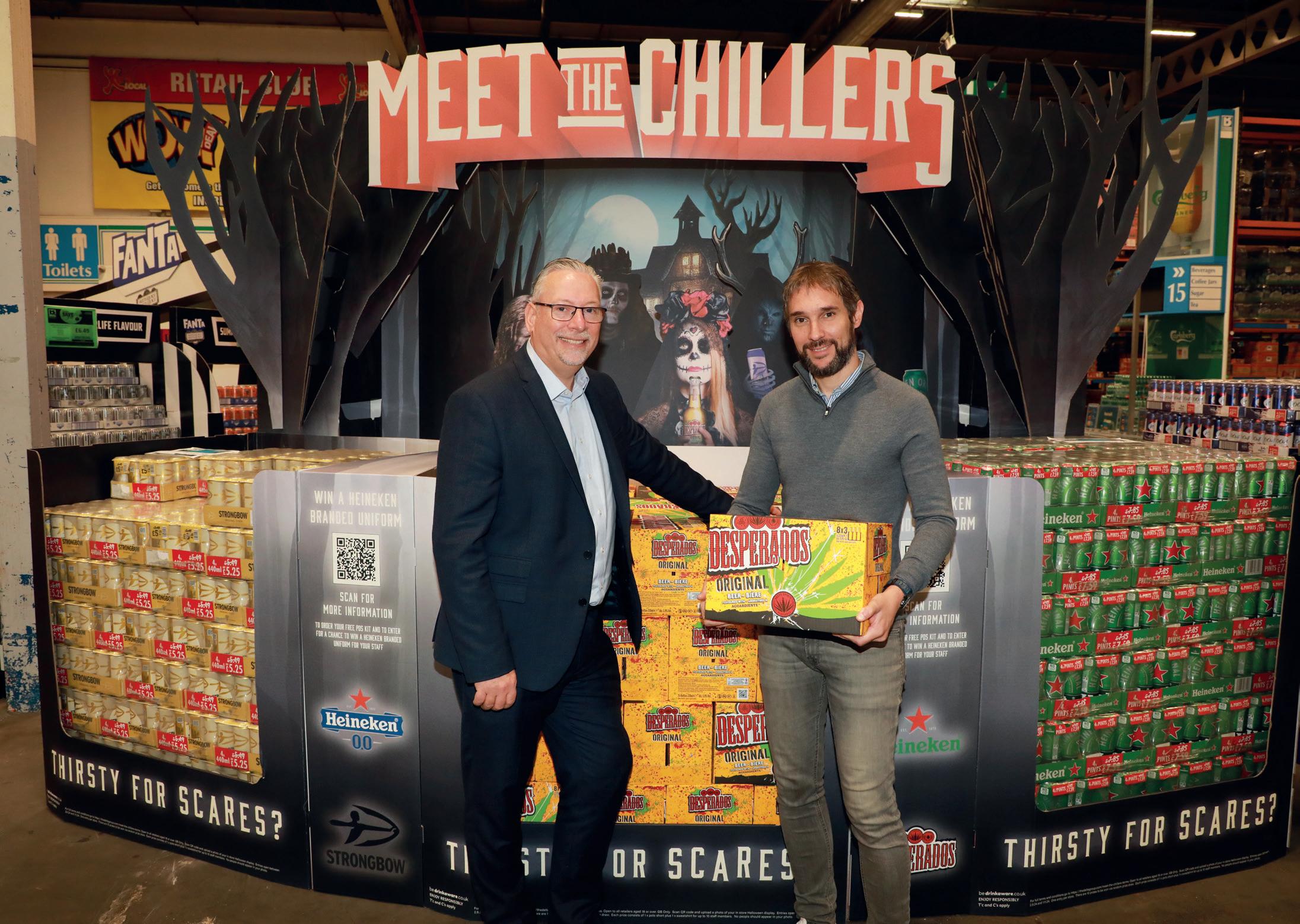
Paul Hill finds out how Heineken UK is working with Bestway and the wider wholesale channel to grow the beer and cider category
Heineken UK has always been one of the leading suppliers of beer and cider to the wholesale channel, with what is a vast portfolio of bestselling brands that are designed to cater to all occasions.
As a key supplier, it continues to support the industry through investment in large in-depot activations and PoS materials, all designed to engage with retailers and their customers.
Lately, it has worked on a project that focuses on a ‘Meet the Chillers’ Halloween activation, which aims to help wholesalers sustain sales during peak trading periods by capturing the attention of retailers.
Customer director at Heineken UK Adam Turner recently visited Bestway’s Park Royal depot and spoke with the wholesaler’s group trading director, Kenton Burchell, to discuss the latest insights and developments within the beer and cider sector. “It’s great to have Heineken UK here in west London for this activation ahead of Halloween. Fantastic supplier partnerships such as this allow us to create brilliant campaigns and increase sales,” said Burchell.
“At Heineken UK, we are committed to investing in the wholesale
channel, and this can be seen by brilliant activations like ‘Meet the Chillers’,” explained Turner. “Increasing the sales of wholesalers and their retail partners is always the main goal of every campaign we develop.”
He continued: “It’s always great to meet wholesalers to help them identify emerging trends across shoppers and their consumption behaviours. For example, we know that when disposable income is tight due to cost of living, beer and cider offers great value in comparison to other categories for the big-night-in opportunity. Consumers still want to enjoy themselves during these times, which links into the category driver of making memories together, so it’s crucial that wholesalers maximise space for the category in depot.”
In addition to this, he described how beer and cider is perfectly positioned to take advantage of the premiumisation trend, with Heineken UK brands such as Birra Moretti and Inch’s Cider performing very well over the past 12 months, experiencing 10.3%1 and 50.6%2 value growth, respectively. Cruzcampo, since launching in August 2023 in the off-trade, is also now worth £71m3
Small and mid-sized beer and cider packs have also grown in


Adam Turner Customer director, Heineken UK

“The wholesale channel is a hugely important part of our business, and we are committed to working closely with wholesalers to bring the beer and cider category to life.”

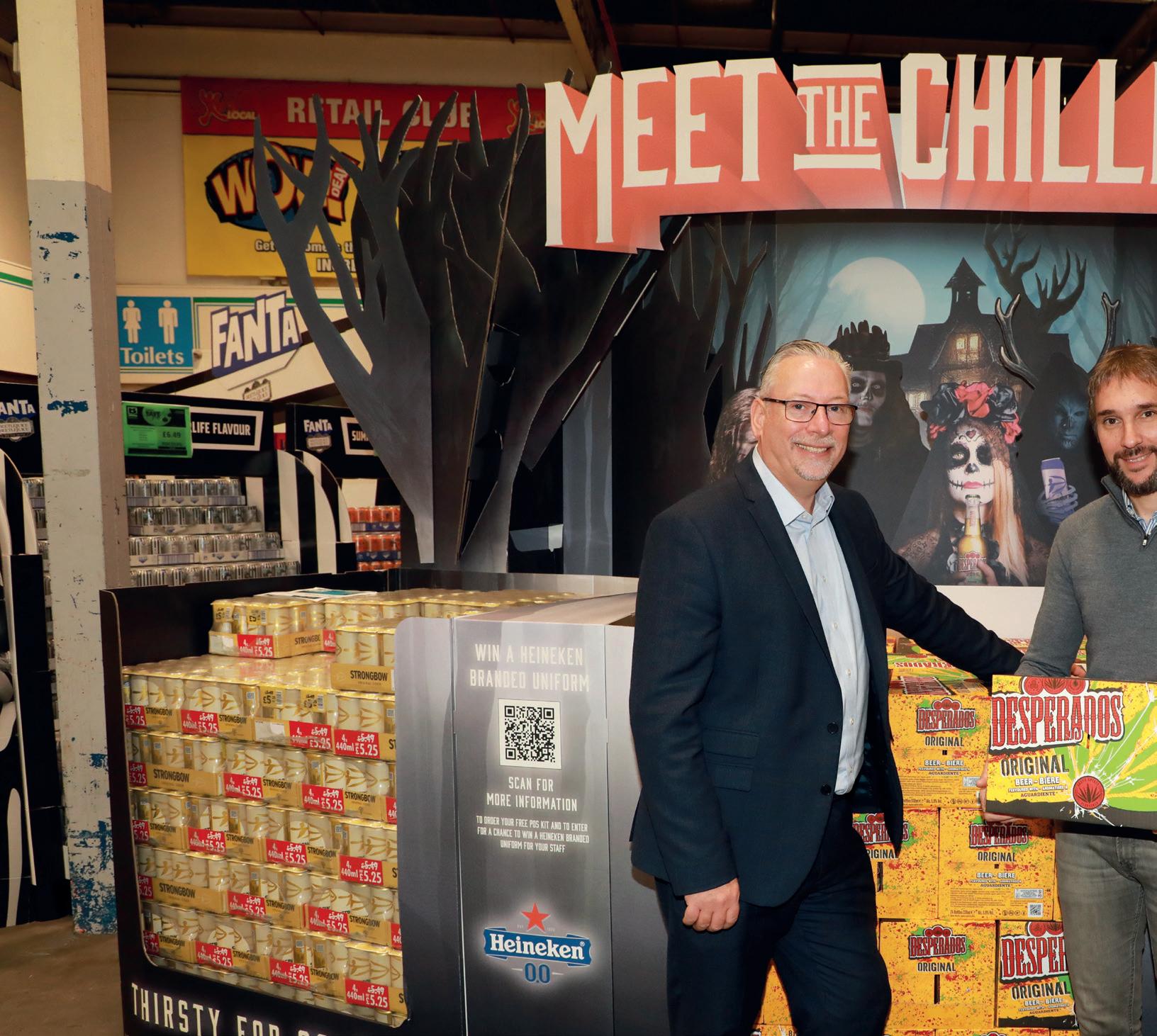
importance, according to Turner. “Stocking brands in these formats is now even more vital during key trading periods to capitalise on the premiumisation trend. But wholesalers should also not forget main stream core products, such as Foster’s and Strongbow, which are still two of the biggest sellers in impulse. These demonstrate how crucial it is for wholesalers to have mainstream lines available,” he said.
“Campaigns like ‘Meet the Chillers’ offer our retail partners a great incentive to buy into the beer and cider category,” added Burchell.
“In the very first week of this activation, we saw sales up 20%, while Cruzcampo and Strongbow Dark Fruit have been in our top five volume sellers over the previous six-week period.”
Heineken UK’s commitment to wholesalers underscores its dedication to fostering long-term partnerships and driving growth across the channel. Through a combination of activations like ‘Meet the Chillers’, education and continued support, the company is helping its wholesale partners thrive in a competitive landscape.
• Beers, wines and spirits have a the wholesale and convenience channel
• One in five6 households shop in the convenience channel multiples time per week
• The Christmas and New Year period is now worth £265m7 within the wholesale and convenience channel
Gilroy’s viewpoint: Working and living sustainably is the greatest challenge of our age. It’s a team game and requires everyone to play an active part

Iconsider myself to be a responsible citizen. I pay my taxes, I give to charities, I am not a drug dealer or a member of an organised crime gang, and I recycle my rubbish. And boy do I recycle my rubbish. Vegetable, compostable matter in one bin. Paper and cardboard in another. Plastics, glass and canned recyclables into a third. In our household and much to the dismay of our incredulous children, the recyclables are washed and dried before they go into the bin in case someone “checks it”.
And as the binmen drive off with our rubbish carefully segregated, that’s our civic duty done. But now the doubts are creeping in. Where does it all go and how is it recycled? I was dismayed recently to read that a large proportion of the country’s plastic returns go to incinerators to generate electricity, which is nearly as polluting as burning coal.
This is the problem with sustainabil-
ity. It’s a subject so vast and on such a scale, where do you start? Here are a few salutary facts as reported in the i newspaper. Fossil fuel emissions have hit an all-time high. Ocean acidity levels and heat content have reached new peaks. Tree cover loss rose from 22.8 million hectares to 28.3 million hectares in 2023. Renewable energy consumption remained at one-fourteenth of fossil fuel consumption. I could go on, but you get the picture. It appears overwhelming.
However, there is good news for businesses in that operating sustainably equates with operating profitably. For many businesses, adopting sustainability measures can seem like a complex and time-consuming endeavour. A focus on four grounded, practical and commercially beneficial areas will help.
While transitioning to renewable energy sources such as solar or wind power may seem like a large undertaking, many businesses are finding that the switch is easier and more affordable than ever before. For companies that are not ready for a full-scale renewable energy investment, there are still quick wins to be found by exploring green energy providers. Many businesses are now installing solar panels on rooftops or parking structures to generate their own energy and reduce their dependence on non-renewable sources. There are still some tax incentives or rebates for businesses that switch to

renewable energy, helping to offset the initial costs and making this transition a feasible option even for smaller businesses.
One of the easiest and most cost-effective sustainability measures businesses can take is switching to energy-efficient lighting, such as LED bulbs. LEDs use up to 75% less energy than traditional incandescent or halogen bulbs and last up to 25 times longer. This simple change reduces electricity consumption and, consequently, lowers utility bills. While the initial investment in LEDs may be slightly higher, the long-term savings in energy costs make it an easy win for sustainability. Additionally, many businesses can pair this step with installing motion sensors in less frequently used areas such as meeting rooms or restrooms, ensuring that lights are only on when necessary. Installing smart thermostats and energy management systems can help businesses optimise their energy use.

These systems automatically adjust heating, cooling and lighting based on occupancy and real-time data, ensuring that energy is only used when it is needed. Refrigeration offers another opportunity to reduce energy consumption. Operating at consistent temperatures saves power, as does a well-executed cleaning programme to keep the equipment clear of dirt and ice build-up. It is interesting to note that many of the multiples are switching to closed-door cabinets for chilled and frozen food displays.
Operating an energy-efficient fleet transport system is a big sustainability win. Smart vehicle routing using optimisation software with real-time data to determine the most efficient journeys is essential. Planning routes that avoid high-traffic zones, where vehicles are likely to be stuck, reduces fuel wastage and unnecessary emissions. Transitioning to electric or hybrid vehicles can
drastically reduce fuel consumption and emissions, especially for shorter delivery routes. Combine this with aerodynamic design, choosing vehicles designed with fuel efficiency. Installing fuel monitoring systems helps track fuel consumption and identify patterns of excessive use, enabling managers to target inefficiencies. Keeping vehicles well-maintained to ensure they run efficiently is a no-brainer. Regular oil changes, tyre pressure checks and engine tuning can significantly impact fuel consumption. Training drivers to adopt fuelefficient driving habits such as smooth acceleration, maintaining steady speeds, reducing idling and minimising harsh braking can cut fuel use by 10-15%. Implement reward programmes to encourage drivers who achieve high fuel efficiency. This can lead to better driving habits. Telematics can track driver behaviour, including harsh braking, over-speeding or excessive idling, which can increase fuel consumption. Load optimisation software to ensure trucks are carrying the maximum amount without overloading, which can reduce the number of trips and fuel usage. There will be opportunities to pick up new loads on the return trip to reduce empty vehicle returns.
There are several ways businesses in the food and drink sector can reduce waste. Monitoring, measuring and targeting waste is a good place to start. Making waste control a key management deliverable will focus minds. Clearly the first and the best way to control waste is to generate as little as possible. Optimising upstream stock input is critically important. Through accurate forecasting using sales data and analytics, you can prevent overordering and reduce the risk of products life-expiring before use. A tighter stock holding also reduces stock handling, damages and clutter. Regular stock checks to identify items nearing expiration and sell through before they become a distress sale is a key component. When waste does need to be cleared, establishing partnerships with food banks and charities to donate unsold food to that is still safe to eat, and helping support communities, is the way forward.
For example, our industry has a high-
ly productive relationship with FareShare, the UK’s biggest charity fighting hunger and food waste. Their chief executive, George White, asserts that the UK is behind other developed countries in food distribution and is calling on the government to support and help “supercharge” activity in this country.
Diverting food that is not suitable for human consumption to animal feed, especially in agriculture or animal farming, is another avenue. Interesting to note Tesco’s partnership with RenEco to unpack surplus food and transform it into pulp or crumb used to feed animals. Their policy that any food that can be eaten by humans should go to humans strikes a chord.
When it comes to packaging, transitioning to biodegradable, compostable or recyclable packaging materials is preferred and will very likely be the minimum standard expected by customers.
One of the fastest ways to create a more sustainable business is to engage employees in sustainability initiatives. By fostering a company-wide culture of environmental responsibility, businesses can ensure their sustainability goals are met quicker and more effectively. Employees can contribute in a variety of ways, from participating in office recycling programmes to suggesting energy-saving ideas or carpooling initiatives. Businesses can incentivise sustainable behaviours through rewards programmes or friendly competitions, such as recognising the team that cuts the most waste or energy consumption in each month.
Training and education are also essential. Providing employees with sustainability training can ensure that everyone understands the company's goals and knows how to contribute, from turning off lights to adopting more sustainable work habits. These efforts not only reduce the company’s environmental impact, but also foster a sense of purpose and community among employees.
Sustainability by its very nature is allencompassing and requires everyone to be contributing. The great news for businesses is that it is entirely consistent with efficiency and profitability within the wholesale channel. l
Paul Hill visits Westcountry Foodservice’s new £3m Devon facility, and finds out about the merger of the MJ Baker and WestCountry operations

James Russell, managing director
Tell us about the reasons for the merger and what it means for the company.
The principal reason was that Kitwave had acquired two strong businesses, invested in a brilliant new site and saw the opportunities to be realised by bringing them together. Each legacy business has a largely discrete customer set and complementary ranges.
We have a base of around 4,000 customers in Devon, Cornwall and the surrounding counties, which we can now serve more efficiently.
Historically, MJ Baker has focused on the cost sector, whereas Westcountry has been more hospitality-focused, so there are benefits from a range perspective as well as staffing and vehicle use at different points of the year.
For example, when schools are on holiday, this frees up our fleet and staff for peak holiday periods in other sectors outside educa-

Chris Blowers, operations director
tion. Previously, we had two delivery fleets going into largely the same geographic areas, so our distribution density increases with this move, with more drops per square mile, we’ve got improved efficiency.
What does this new site offer the newly merged company?
This new facility took 18 months to build at a cost of £3m, and there are obvious advantages to moving into a newly built depot.
It significantly increases efficiency through its modern processes, and we are also benefiting from the step changes in refrigeration technology, which will drive down cost and carbon.
Having our full range available on one site, we will also see cost benefits compared with our old multi-site model.
We’ve already seen benefits in moving to scan picking and are trialling voice-pick technology,


which we believe will transform picking operations, particularly given our high volumes of individually picked produce lines.
We are working with our teams to harmonise our processes and approaches, and expect to expand the team further to support our growth plans.
What is the digital offering of the new company?
We did a soft launch with Foodservice Online in October and tested it with a select few customers in the first couple of days. Within three days, 30-40 customers had found out about it after an organic, positive word-ofmouth spread.
This new digital offering will complement what I believe makes our proposition unique and that is being able to deliver 13 times a week. This means certain customers can theoretically order by 11pm and have the
order in their kitchen by 6am the following morning.
What will be the financial performance of the new company?
The combined revenue of both companies will now be just above £70m. I look at this site here, and it’s capable of supporting a business that is well beyond that in the future.
We don’t have a transient customer base, and if you were to split our customers by west (towards Cornwall) and east (towards Devon), market penetration is high and basket penetration is a little lower in the west, whereas it’s the opposite in the east.
That presents us with a chance to sell more to the existing customer base.
Which customer sectors are you targeting?
Our primary objective is to bring the operations together, deliver



efficiencies and synergies, and grow the customer base.
Short-term objectives include ensuring that MJ Baker customers are now getting more fresh fruit and veg, and that Westcountry customers are benefitting from mainline foodservice products and frozen items.
We’re also developing a strong on-trade offering with locally produced artisanal spirits, so there’s an opportunity to grow that and expand our service to pubs beyond traditional foodservice categories.
What would you consider your USP?
I like to think we put the ‘service’ in ‘foodservice’. What has blown me away since I joined is our relationship with local growers.
We work with farmers to give them the capacity to grow and have circular arrangements with them.

Nothing gives me more pride than visiting our customers’ restaurants and seeing servers bring the back story of locally grown ingredients to life at the table.
It’s a beautiful story and not something you normally get from a major foodservice business.
How have your sustainable credentials improved since moving into this new facility?
We know that by increasing distribution density and vehicle use we’ll see an immediate benefit with a significant reduction in vehicles on the road and food miles being seen from day one.
We are also maximising our photovoltaic (PV) panel coverage, and have seen the benefits in our Falmouth depot, which often doesn’t use the grid during the day.
The Country Range group is proactive in supporting members on their Net Zero plan and are
helping us measure, plan and benchmark ourselves, which will help us to further reduce our Scope 1 and 2 emissions.
What do you think the potential is for Westcountry Foodservice and the Kitwave Group in the long term?
The Kitwave growth story and ambition is compelling. It’s a business that doesn’t want to stand still and aims to grow and deliver for our shareholders. We believe that by building our strengths and capability, we can drive significant growth in our immediate region and beyond.
The Creed acquisition surprised a few people in the market, and helps cement our national-challenger status. I’m excited about the opportunity for us to realise that potential.
Paul Hargreaves is the chief executive of Cotswold Fayre

It’s just over nine years since Cotswold Fayre certified as a B Corp with around 40 other companies forming the early UK B Corp community. There are now more than 2,000 UK businesses certified as B Corp, which represents the fastest-growing community in the world. Many business leaders are now aware of the movement, but let’s remind ourselves what B Corps are, then I will go on to talk about the benefits we have expe-
rienced as a wholesaler by being part of this growing community of good businesses. There are three elements to becoming and remaining a B Corporation.
1. Legally, directors must change their articles of association for the company at Companies House, so the business is legally existing for the benefit of all stakeholders – that’s their workers, their supply chain, the environment, the local
community and their shareholders. In the default Companies House articles there is only one group of legal beneficiaries of a business –the shareholders.
2. There is a rigorous assessment process measuring how you benefit the world in five areas –governance, workers, community, environment and customers. You can have a look and run your score at bcorporation.net. For our business with more than 100
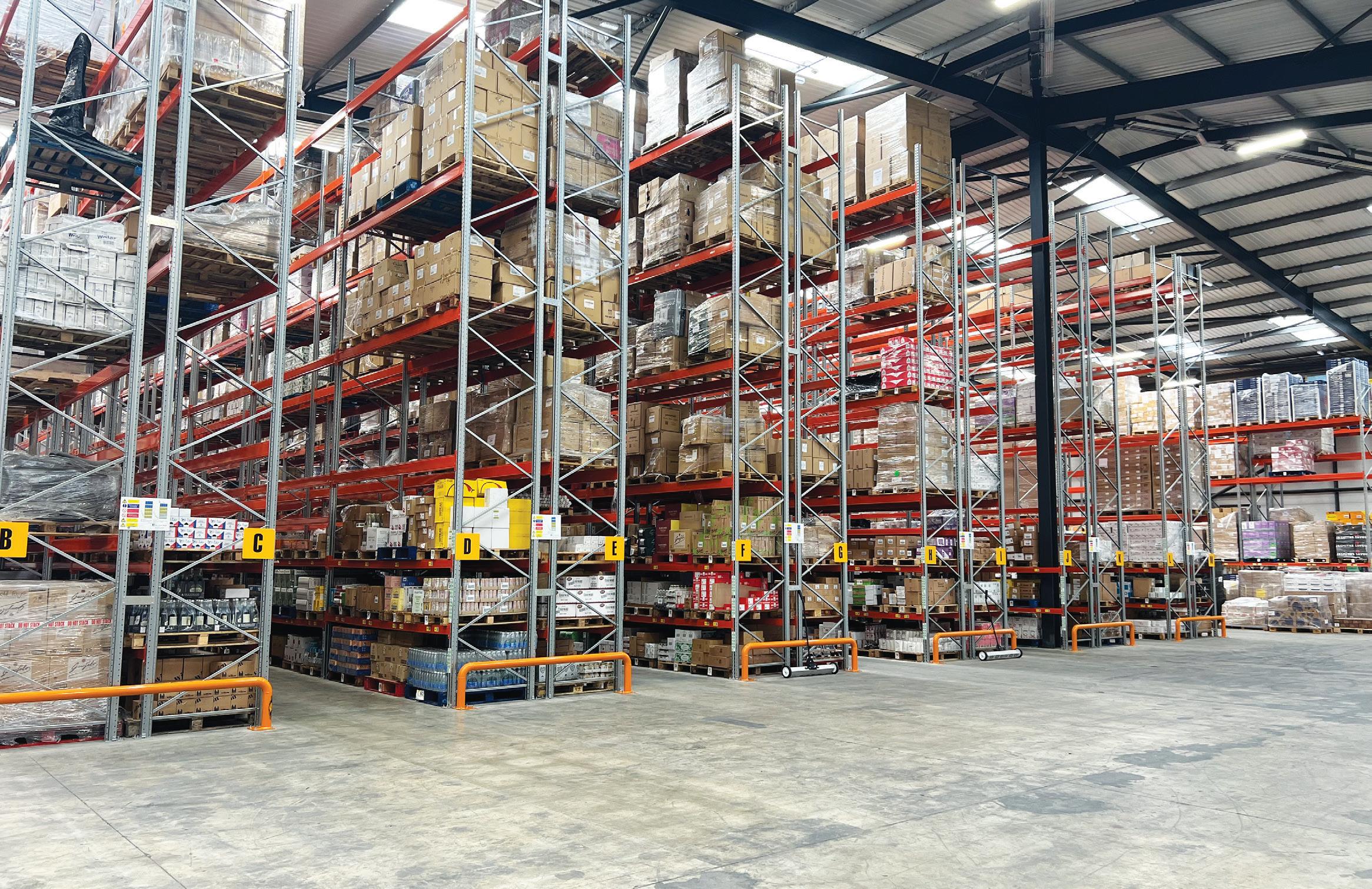

workers, the assessment consists of around 230 questions, and there must be evidence to prove everything you say you do.
3. B Corps also produce an impact report every year showing what they have done to benefit the world in those five areas.
As Cotswold Fayre was originally set up as a business to benefit under-served workers, we certified as a B Corp in 2015 without too much change.
One great aspect of the certification is that the standard becomes higher each year, so if you see B Corp as a destination rather than the start of a journey, then you may drop out in later years. The whole certification is completely changing in 2025 to ensure businesses reach a certain level of attainment in eight different areas.
The second huge benefit of going through the assessment every year – although we are only audited every three years – is to see areas of our business where we are not scoring points, that is to say, where we could do better.
These weaknesses then form part of our annual strategy to improve our social and environmental sustainability. We also unashamedly copy fantastic ideas we see being implemented in other B Corps.
I am frequently asked in interviews how we have benefited as a business through being a B Corp. Often, what the interviewer means is, ‘How have you grown in revenue or profit by being a B Corp?’ I’m not sure this is the right question to be asking, but for most of the past nine years, being part of this community hasn’t attracted customers to us, although that has started to change over the past couple of years.
However, we have experienced several huge benefits. Here are two. Firstly, the B Corp framework has significantly helped us develop our sustainability strategy and articulate our purpose and reason for being far better to our workers, customers and suppliers.
Secondly, and particularly over the past two-to-three years, it has helped us attract much better people to come and work for us.
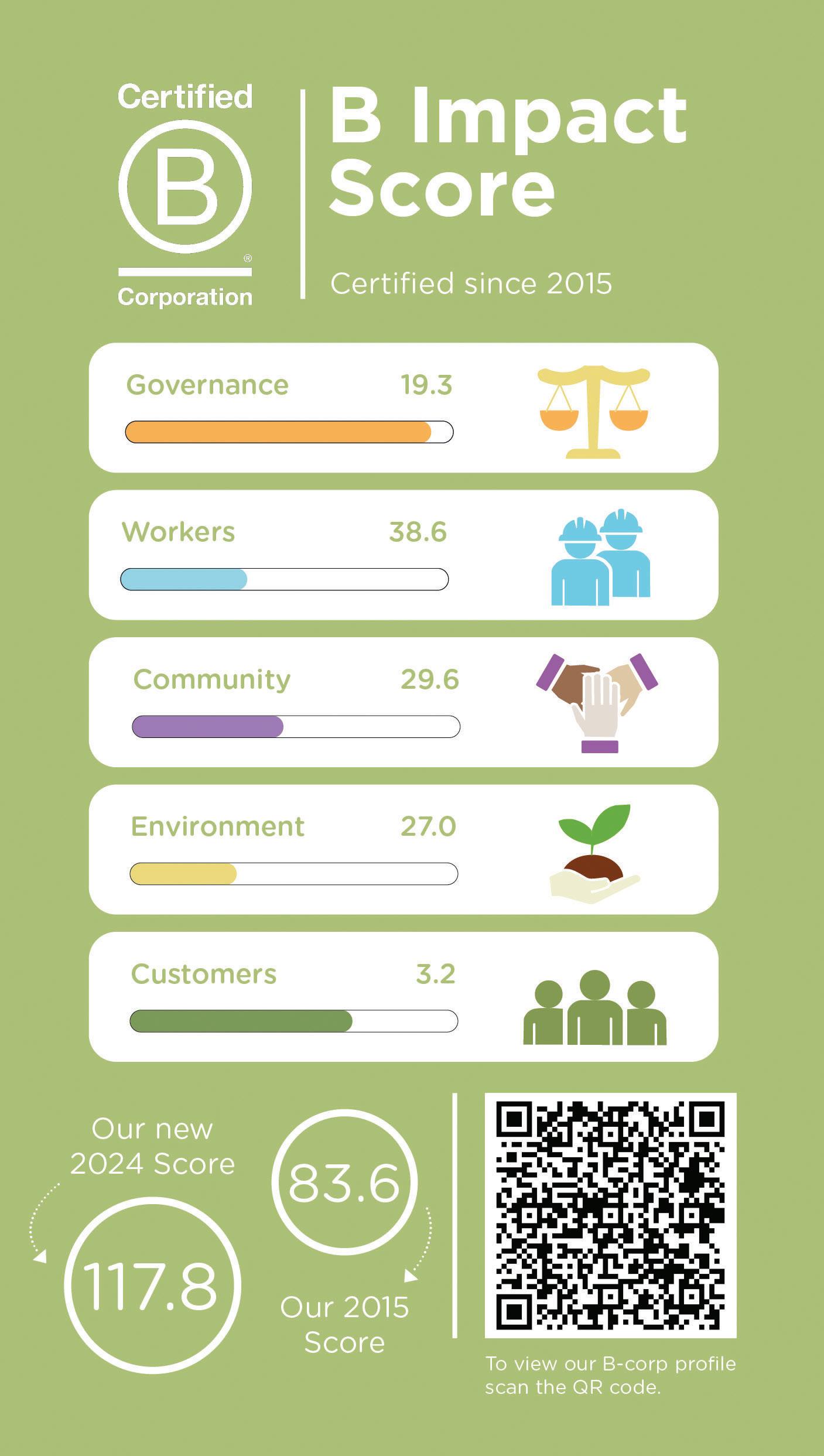
Great people can choose to work wherever they like and are far more likely to want to work for a company that is positively affecting the world.
Wholesalers, whether they know it or not, are in a huge position of influence, as they often have thousands of customers and many hundreds of suppliers, more than most businesses. So, why not use that influence for good? At the start of the Covid-19 pandemic, I counted our B Corp suppliers. There were six. Now, only fourand-a-half years later, we have
more than 80. We can’t claim credit for influencing all of them, but many we can, and our sense of purpose has increased knowing that 20% of our supplier base are aligned with us on purpose.
If you have thought about looking at B Corp but have never found time, now might be that moment.
What I have come to discover over the past nine years is that putting people and planet before profit not only means running a more fulfilling business, but also that profits often increase, too. l
City Harvest is a food distribution charity that works with several wholesalers including Brakes and Cotswold Fayre. It uses its donations to give free food to more than 375 charities, such as food banks, children’s programmes and local groups.
It recently unveiled an annual report that demonstrated the value of food redistribution through the charity’s research and data. The report covers topics such as food poverty, food waste and the benefits of why wholesalers should
work with a food-redistribution provider.
“The UK food industry plays a critical role in securing self-sufficiency in healthy and affordable food,” read the report. “However, fulfilling this mission is becoming increasingly more difficult.
“Despite some positive developments in the regulation of fruit and vegetable imports from the EU and Switzerland, the food industry has been significantly affected by unfavourable trade and climate conditions – from post-Brexit checks and charges to the UK experiencing its wettest
1. Effective and clear policy objectives that support domestic food production and minimise supply chain disruptions and potential food price hikes
2. Support British farming by transforming the public sector procurement model and establishing long-term partnerships
3. Develop a centralised coordination mechanism for redistribution between the government, the third sector and businesses
4. Invest in agriculture technology to combat climate change and to promote the expansion of farming, stabilise domestic food production, increase crop yields and reduce the reliance on imports l
year on record. Both challenges are expected to increase food prices at a time when the UK population – especially the poorest – have already been disproportionately affected by existing food price inflation.”
City Harvest plays a critical role in alleviating this crisis: by redistributing surplus food, it feeds people who are finding food increasingly unaffordable. At the same time, by collecting surplus
food from industry partners such as wholesalers, it is well-positioned to articulate the current challenges and proposed solutions from the industry’s perspective.
The data and insight behind this report have been gathered from desk research as well as a bespoke survey of representatives from a wide range of food businesses, including producers, wholesalers, manufacturers, sales and marketing agents, and foodservice.
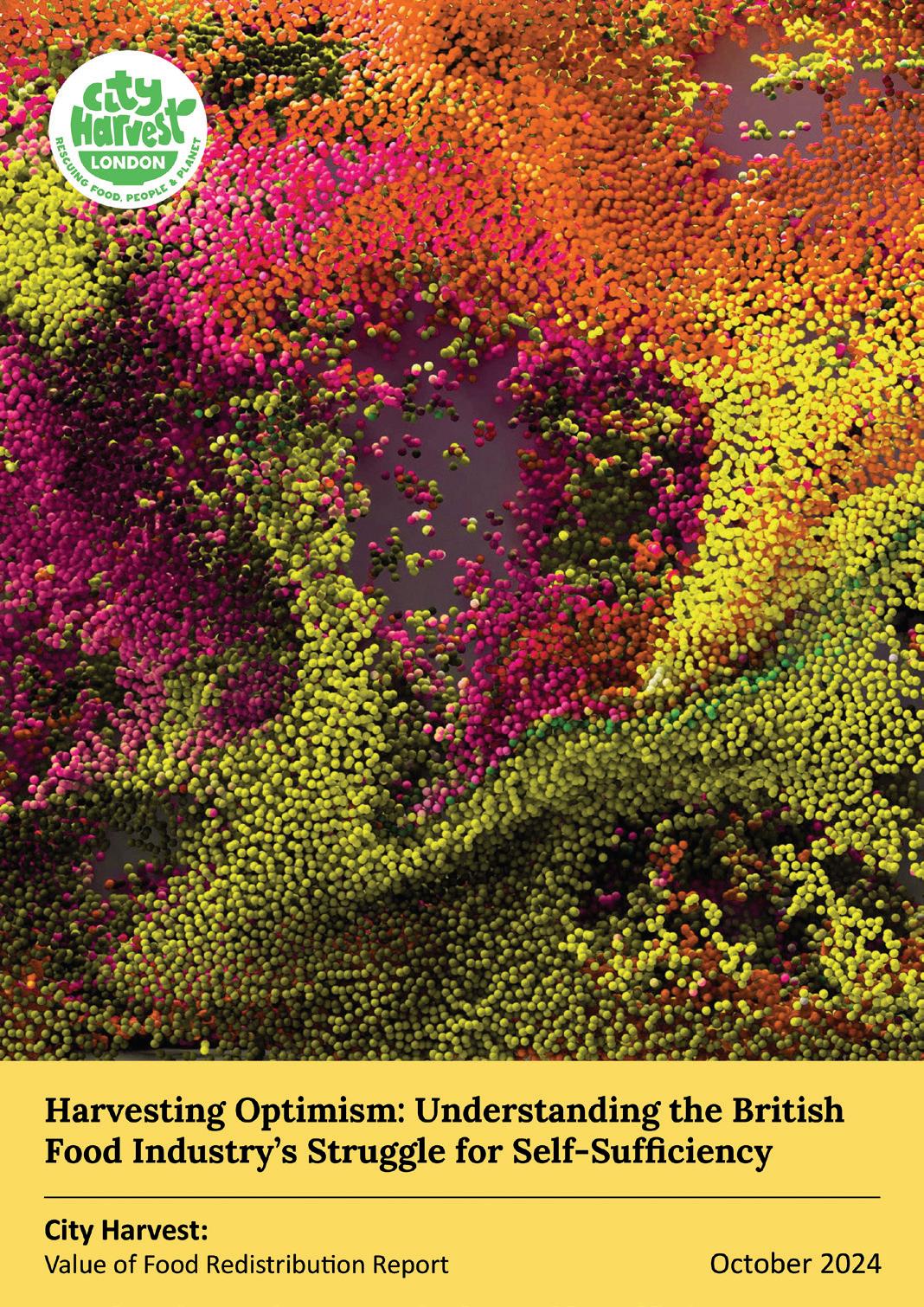



Following the appointment of Ylva Haglund as head of sustainability in 2022, the SWA has further developed its sustainability programme, with priorities and actions noted in the ‘Decarbonising the Scottish Wholesale Sector’ report, which explores the sector’s carbon emissions and attitudes to climate action.
The report was launched alongside the UK Wholesale Sector Net Zero Roadmap, developed in collaboration with FWD, last year.
SWA’s research for north of the Border identifies key sources of operational greenhouse gas (GHG) emissions (Scope 1 and 2 emissions) for the sector as road transport – particularly HGVs – at 63.7%, followed by electricity at 17.7%, use of fuel to heat buildings at 8.6%, refrigerant leaks at 6.5%, and LGVs and cars at 3.4%*.
The report also identified a critical need to work together across the food and drink supply chain to
reduce climate change emissions, as wholesalers are only directly responsible for approximately 4% of these in the operation of their businesses (referred to as Scope 1 and 2 emissions), with the majority in the chain upstream from manufacturers and suppliers (referred to as Scope 3 emissions).
In October, it was revealed that Edinburgh-based wholesaler Mark Murphy Dole has reduced its food waste by 33% after taking part in a collaborative project with SWA and Zero Waste Scotland.
The wholesaler embarked on the six-month project in autumn 2023, focusing on four steps to tackling food waste: assessing its existing food-waste data; measuring its food waste; analysing the findings; and developing a plan of action. The project used Zero Waste Scotland’s One Month Challenge guidelines as a starting point.
Despite making up only 0.2% of the total food passing through the depot, the fresh produce wholesaler’s findings revealed an unexpected savings opportunity as the amount of food waste within the business over one month measured 1.62 tonnes – the equivalent to 19.5 tonnes per year, identifying savings of £11,877 in disposal costs alone. The true cost of this food waste, i.e. all the associated costs such as purchasing and handling, was estimated to be £61,000 per year to the business.
Meanwhile, an audit of the company’s bins revealed that food waste was routinely discarded in general waste bins rather than
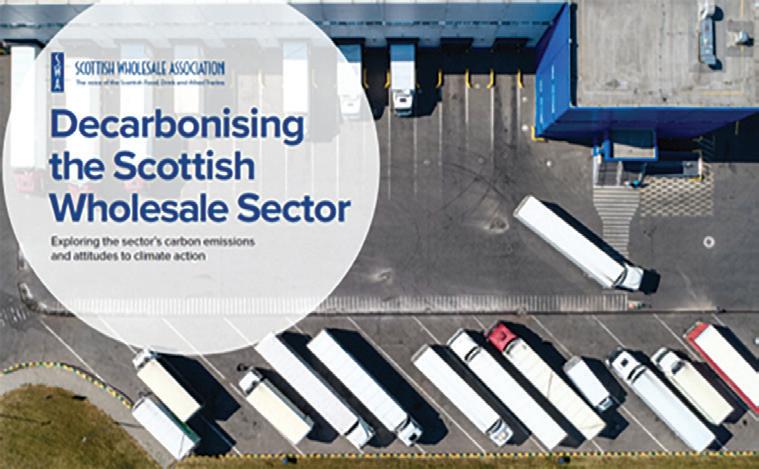
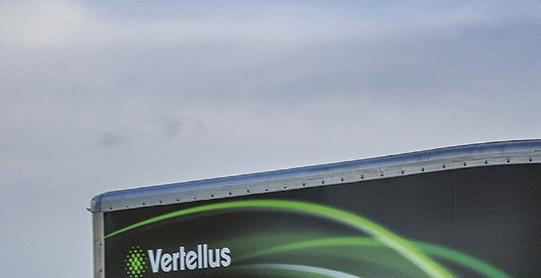
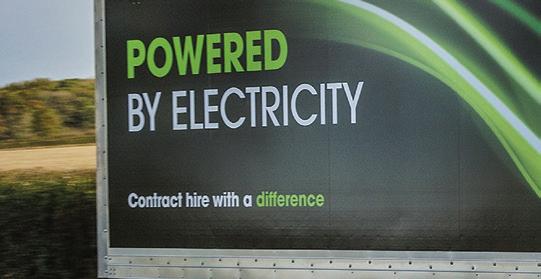

dedicated food waste bins. It was estimated that food waste generated was therefore, in fact, 10% higher than first thought.
As part of the project, Mark Murphy Dole introduced a Green Champion programme. Following training and staff engagement, an improvement could be seen, including a 32% decline in contamination of the general waste stream, compared with the previous year. The recycling rate also improved by 5%, probably as a result of less contamination in the general waste stream.
Acting on the audit recommendations, Mark Murphy Dole focused on improving food waste measurement, introducing staff communication, training and engagement on the subject, and updating food waste processes and procedures.
Haglund said: “Thanks to a combination of interventions –from new practices to monitor
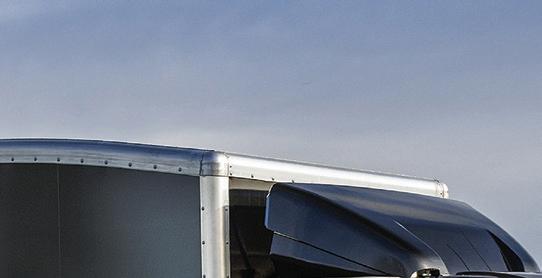
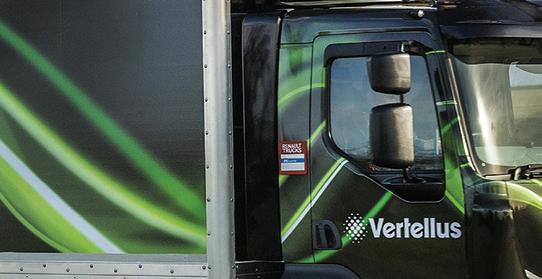

and reduce food waste, to the efforts to change culture and attitudes in the organisation – Mark Murphy Dole has reduced food waste by 33% from 2023 to 2024.
“These results show what’s possible when a business commits to measuring and monitoring its waste, and looks to tackle it in a holistic way, making sure all relevant policies and processes help promote food-waste reduction.”
Haglund also stressed the importance of measuring food waste. “Until you do, you won’t know the opportunities that food waste reduction could bring in terms of financial, environmental and community benefits,” she said. “From a wider wholesale perspective there is an opportunity for the sector to be a force for good on food waste.
“Thanks to their position in the middle of the supply chain, wholesalers are in a unique position to instigate change to reduce


Thanks to their position in the supply chain, wholesalers are in a unique position to instigate change to reduce food waste across the industry
food waste across the food and drink industry.”
Regarding transport, the SWA, together with other senior leaders from Scotland’s HGV industry, has developed a suite of actions to help the sector transition to Net Zero.
The HGV Decarbonisation Pathway is the result of 18 months’ work by the Zero Emission Truck Taskforce. SWA has been a member of the taskforce, chaired by Transport Scotland, along with organisations from the haulage and
logistics sector, energy sector (hydrogen and electricity), truck manufacturing, government, unions and commercial financiers.
This pathway, published this year, sets out the four key challenges posed by a move to zero-emission trucks – and how to address these: energy infrastructure, financial models, confidence in technological and commercial change, and workforce skills.
Supporting members with transition to zero-emission vehicles is another crucial part of this work and the SWA is assisting members who wish to trial electric vehicles (EV) in their businesses.
SWA is working with Renault to offer members the opportunity to rent a fully electric 18-tonne HGV for 12 months at the near equivalent cost of renting a diesel HGV, and with the option of a breakout period after three months. SWA also has an ongoing collaboration with Volvo, which has included EV HGV trials and a case study can be found online.
To support members in engaging with suppliers in order to tackle those all-important Scope 3 carbon emissions, SWA is offering Scope 3 GHG Emissions
workshops to members.
The workshops aim to engage key suppliers to raise overall awareness of Scope 3 GHG emissions and to identify carbon reporting needs in line with Science Based Targets Initiative (SBTi) Supplier Engagement Guidance. Workshops are intended to stimulate discussion on high-level decarbonisation opportunities available to individual organisations individually and through partnerships.
They have been developed based on a pilot that took place in 2023 at JW Filshill, in collaboration between SWA, the Scotland Food & Drink Net Zero Commitment Programme and JW Filshill. ●
*The 0.1% missing from the diagram is ‘other Scope 1’, which captures other sources of Scope 1 emissions not categorised under the main sources.
explains how the wholesaler puts sustainability at the heart of every business decision the wholesaler makes
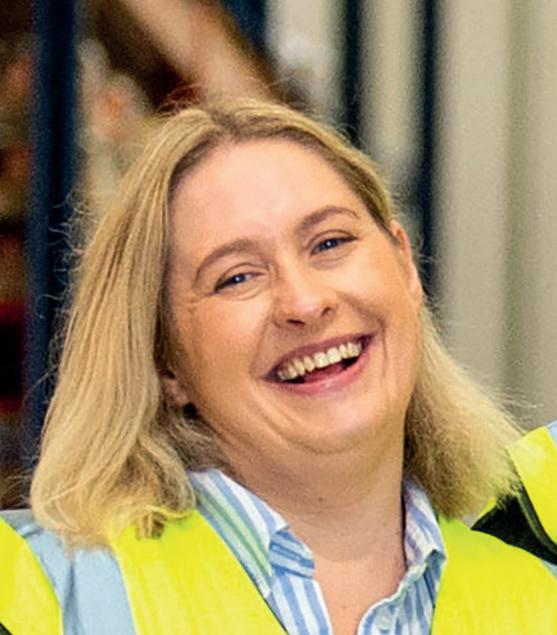
In an industry where efficiency often comes at the cost of sustainability, we are demonstrating that the two can coexist. Guided by our mission of ‘Making a difference with every delivery’, our Bury-based business is dedicated to reducing environmental footprint and enhancing social value within the communities it serves – all while ensuring operations are sustainable and positioned for long-term success.
A cornerstone of our sustainability efforts has been success in cutting plastic waste. In 2022, we slashed plastic usage by an impressive 70%, followed by an additional 60% reduction in 2023. This success stems from strategic investments in advanced packaging and operational efficiencies, proving that going green isn’t just good for the planet – it can also
make sound business sense.
Dunsters Farm also made carbon reduction a top priority, placing a strong emphasis on carbon emissions. By closely monitoring our carbon output, we achieved a 15% reduction in carbon intensity per million turnover between 2022 and 2023. Among our most ambitious goals is the pledge to reach Net Zero by 2038 – an integral part of our long-term sustainability strategy.
Ethical sourcing and sustainable procurement
Dunsters Farm’s sustainability strategy extends beyond our internal operations. We are dedicated to ethical sourcing and working closely with supply chain partners to minimise environmental impacts.
Furthermore, Dunsters supports capacity building within our supply chain by offering educational initiatives and training programmes on subjects such as carbon literacy – ensuring a commitment to sustainability is embedded throughout the entire supply chain.
Community engagement and social value
Our sustainability ethos encompasses more than just environmental concerns; it also prioritises social value. The company is an active member of the Greater Manchester Good Employment Charter, a real living wage

employer, and has invested in skill development, supporting apprenticeships and career growth within the company.
Dunsters also takes its community engagement responsibilities seriously. Through partnerships with Key 4 Life (which helps rehabilitate at-risk youth) and the Bury Employment Support & Training Agency, the company offers employment opportunities to disadvantaged individuals in the community.
We are continually engaged in forward-thinking projects to further enhance our sustainability credentials. Since 2015, the company has implemented several
impactful projects to help. Here is just a selection:
• Installing LED lighting with infrared sensors.
• Reducing fuel inefficiency through telematics.
• Recycling all cardboard, plastic and pallets.
• Business travel emission-free, with fully electric company cars.
• Implementation of voicepick system; saving more than 200,000 sheets of paper annually.
• Dynamic routing systems, aiming to reduce fuel consumption by 10% in April 2025.

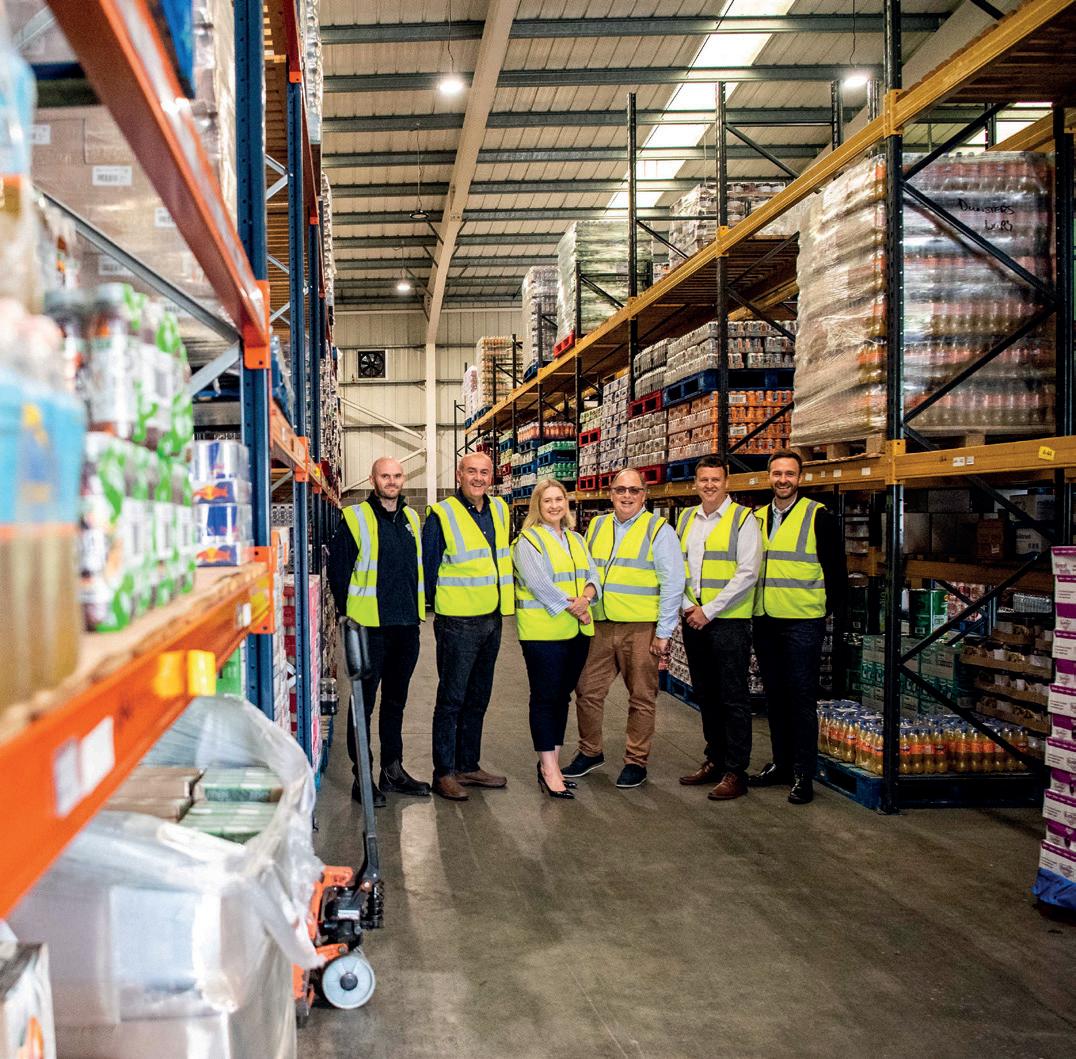
We have also taken innovative steps to reduce reliance on fossil fuels. Dunsters backhauls from suppliers, ensuring that delivery trucks return loaded rather than empty, and is planning a solar array to cover 50% of its energy needs by 2025.
We also proudly operate as a zero-to-landfill site, recycling all office and mixed municipal waste through a carbon-neutral partner. Food waste is minimal as surplus
food is donated to local charities or shared with staff.
As a member of the Caterforce buying group and the Federation of Wholesale Distributors, we share sustainability practices with other industry members. The company also collaborates with researchers from Manchester Metropolitan University’s Department for Strategy,
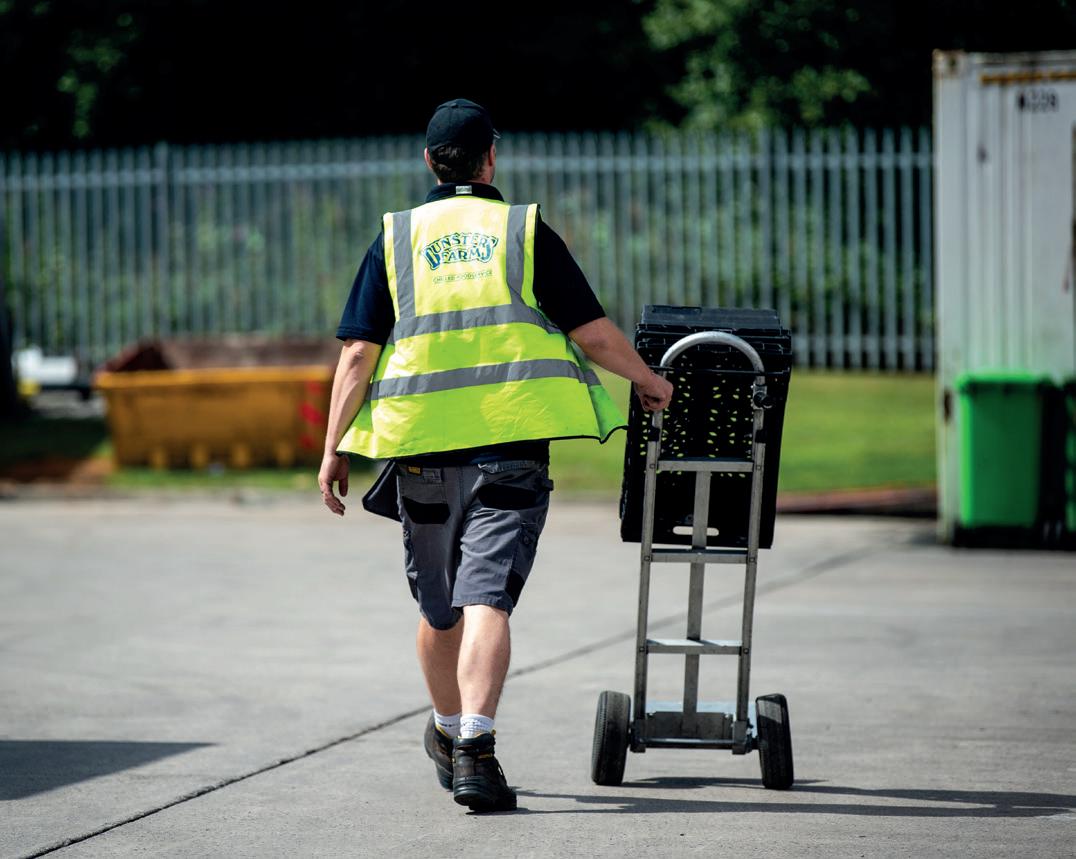
Enterprise and Sustainability, exploring new sustainable solutions for food-supply chains.
Our contributions to sustainability have not gone unnoticed in the academic community, either. The company’s sustainability lead has presented research studies from Dunsters Farm at the 10th International EurOMA Sustainable Operations & Supply Chain Forum and made contributions to the 33rd Annual Production & Operations Management Society (POMS) Conference.
The company’s efforts in
decarbonising the supply chain were also showcased at the 10th International Workshop on Sustainable Road Freight Transport in December 2023.
A vision for the future
Dunsters Farm exemplifies how businesses can thrive while prioritising environmental responsibility and social value. By integrating sustainable practices, fostering community partnerships and driving innovation, the company is setting a new standard for sustainability in the foodservice industry. l
Leading figures from across the channel give their take on sustainability and how they implement green practises across their operations
Edward Morgan Group ESG manager, Castell Howell Foods
Sustainable development is about working differently. For Castell Howell, this means looking to the future and integrating sustainability to our activities. Ourselves and our supply chains are well placed to advance the life-long food choices and eating habits of our customers and lead efforts towards a healthier, more sustainable food system.
Charles Duthie Head of retail, Appleby Westward
In a move towards reducing food waste, Appleby Westward began trialling Too Good To Go’s end-to-end surplus-foodmanagement solution from October 2024. This trial, taking in 19 Spar stores across the region, marks an exciting next step in the ongoing partnership between Appleby Westward and Too Good To Go. The new solution will allow participating stores to seamlessly track and redistribute surplus food, making stock management more efficient and optimising decision-making around markdowns.
We’ve been working with Too Good To Go since 2020, unlocking value from surplus and reducing food waste via its app, the world’s largest marketplace for surplus food with 100 million registered users and 170,000 active
We recognise that climate change will have detrimental impact on where we source our food, and that we need to take positive actions to mitigate these risks. In July 2024 we launched our Sustainable Supplier Network, with a focus on our indigenous dairy supply chains. We are working with Auditel to manage our Net Zero ambitions, and we’re partners in the Welsh Veg for Welsh Schools initiative, working with a cohort of eight organic growers and six local authority catering teams.
partners. This partnership has already played a significant role in ensuring that unsold food is made available to local communities at a reduced price and has saved more than 30,000 meals from going to waste.
As well as this, we’ve partnered with FareShare South West and Gregorys Logistics and redistributed the equivalent of 24,400 meals, taking its total to the equivalent of 32,000 meals. Those 32,000 meals came from 10.2 tonnes of food, which was distributed via charities and community groups to 54,000 people. With warehouses in Plymouth and Bristol, FareShare South West rescues good, surplus food from local food suppliers and delivers it to more than 380 charities, schools and community groups – from Gloucester to Cornwall.
FareShare builds partnerships with various businesses to achieve its mission, such as the one with Appleby Westward Ltd and Gregorys Logistics.
Debbie Harrison Joint managing director, Pricecheck
Pricecheck is passionate about our journey to becoming a more sustainable business, so much so that we’ve pledged to be Net Zero by 2040. As part of this pledge, we’re reviewing each area of business operation – from exploring alternative solutions with our hauliers and aspiring to introduce more renewable energy sources. To work towards our 2040 target, we’re keen to adopt a more responsible mindset and encourage transparency in the wholesale sector.
An area Pricecheck has begun focusing on is our Scope 3 emissions, considering who we trade with, and encouraging the process of backhauling as an industry, to a point where it becomes ‘the norm’.
David Menendez Managing director, Mevalco
Sustainability is very important to us at Mevalco and, in particular, the provenance of our products – which is one of the biggest areas we are focused on in terms of sustainable and ethical sourcing. Our suppliers and partners are chosen carefully to very specific sustainable criteria.
We choose to work with suppliers who source, grow and rear their products in areas particularly acclimated for those products and methods where the production reflects the terroir and the local climate.
We have taken a conscious decision not to work with large corporations, and instead work with small and medium-sized companies where the workforce is looked after, and keeping their rural communities alive is key. Our supply partners work to generational old traditions and methods, which is blended with forward-thinking policies to ensure social mobility giving support to their workers.
We want to work with suppliers that, although are rooted in tradition, use technology to reduce their carbon footprint and use of water. We also source MSC British Seafood with Rockfish and Jose Pena. The fish used comes direct from the British coast.
Dawood Pervez Managing director, Bestway Wholesale
Bestway Wholesale is a supporter of the SBTI (Science Based Targets Initiative), which ensures words are backed by measurable actions. Every element of the business is dedicated to doing business in an ethical and sustainable way, and continues to spearhead initiatives in this arena, including initiating ESG reporting. Bestway is meticulous in seeking to ensure that the measurable goals are achieved.
Examples of the sustainable policies and strategies that have been implemented:
• Sustainable transport solutions through optimising delivery footprints, backfilling on routes and use of electric networks. Deliveries to customers are optimised by constantly reviewing frequencies and routes, ensuring the right service for each retailer (while helping carbon footprint). Bestway plans to reduce its fleet by 25% through the use of 24
regional hubs, significantly cutting carbon emissions.
• Working with suppliers to make continual improvements in packaging and plastic reduction. And now, 95% of all Bestway’s print and packaging is recyclable as it strives to improve even further on this figure.
• Working with suppliers to help navigate the issues around supply shortages and minimise cost increases through investing in forward stock and providing storage to help them minimise cost.
• Working with suppliers to gain further understanding across their Scopes 2 and 3 emissions to carbon footprint products and ingredients to drive best practice and reduce carbon.
• Reducing waste and working with charity partners such as The Felix Trust to minimise waste while helping those in need.
• Optimising clean energy opportunities
across solar and lighting – replacing lighting across 65 depots with energy-efficient LEDs and working across retail estate to support energy-efficient schemes. Bestway plans to install solar panels with a capacity of 7 megawatts with the aim of reducing electricity usage by 30%.
• Encouraging consumers to see the opportunities in shopping locally and supporting understanding of the benefits, especially during the cost-of-living crisis. Increasingly, promoting shopping locally is a way to save money, reduce waste, minimise travel costs and emissions, get exercise and participate in the local community.
• Championing health and well-being. Bestway’s pioneering approach to sustainability is demonstrated with the Bestway Good Food Project Bestway study showing the value of healthy food – this initiative (that leans into government policy), has shown retailers how they can align to the government agenda and help tackle obesity through selling healthier products with no loss of margin.
Any food that isn’t suitable to be donated is frozen on pallets and sent to anaerobic digestion to help make green energy for homes
Mark Murphy Operations director, Thomas Ridley Foodservice
Thomas Ridley Foodservice is committed to reducing food waste and its carbon footprint. A long-standing partnership with a local charity, called Still Good Food, ensures as much short-dated food and drink stock as possible is donated – so that it can be made available to the community through the charity’s two food-waste shops. Any food that isn’t suitable to be donated is frozen on pallets and sent (one lorry load at a time) to anaerobic digestion to help make green energy for homes. In order to help its customers be more sustainable, Thomas Ridley also supports cardboard recycling, by collecting and baling used cardboard from customers, free of charge. The total cardboard recycled this
year to date, including both Thomas Ridley’s own cardboard and that of customers, is 150 tonnes. Thomas Ridley also promotes a beneficial cooking oil recycling scheme for customers, run by a third party, which provides cashback on the oil recycled – a scheme that is very popular.
Thomas Ridley has also greatly improved efficiencies over the past six months by optimising delivery routes, saving 2,000l of fuel a month and around 5,000kg of CO2. This has in part been achieved through installing a new route planning software, called Podfather.
This technology also promotes paperless deliveries, by operating a digital system where customers can ‘sign on glass’, as well as access live delivery updates. This IT has saved Thomas Ridley approximately 800 sheets of paper a day, and makes the delivery process much faster and convenient for customers; providing both tangible carbon
savings and improving customer satisfaction. When it comes to energy consumption, Thomas Ridley has also been able to save 6,000kwh per month through various improvements to its warehouse lighting and by upgrading all warehouse doors, to rapid action doors.
Reducing the carbon footprint of an organisation of our size can be really daunting, but by finding smaller, practical savings across the business and utilising new IT systems, we’ve been able to make some really savvy improvements with fantastic benefits when it comes to our sustainability. We have a lot more that we would like to tackle, especially when it comes to the packaging we use for our online B2C orders, but we feel it’s worth taking the time to get things right and not rushing into changes. Rushing can often incur additional business costs down the line, if it’s not the right solution for you.



Our suppliers and partners are chosen carefully to very specific sustainable criteria
Caoire Blakemore Responsible business director, AF Blakemore & Son
AF Blakemore & Son is committed to building a better future for future generations, which is why sustainability is at the heart of everything the business does.
From energy-saving initiatives to electric lorries and reducing food waste, Blakemore is driving sustainability for customers, colleagues and communities.
As a business, we have been investing in energy-saving refrigeration. Last year alone, £5.3m was invested in new refrigeration across 72 Spar Blakemore Retail stores, which reduced electricity use by up to 8% on average. The business is continuing this meaningful investment, aiming to refit the refrigeration in another 32 Spar stores by the end of the financial year. This year’s target is to achieve an electricity reduction of 25%.
We are incredibly proud of the steps we are taking to ensure a better future for future generations. We are well underway to achieving our goal and reducing the consumption of electricity across our business as we look to become a carbon Net Zero company by 2040.
AF Blakemore & Son has been among the first in the industry to purchase and use electric HGVs for deliveries across Willenhall and Bedford. The electric HGVs and the business’s target for 70% of company cars to be hybrid or electric is currently helping us to reduce its carbon emissions.
As a result of such investments, the business has reduced fuel consumption by 22% YOY. This year plans to reduce fuel consumption by a further 5% are progressing well, placing the business on track to become a Net Zero carbon company by 2040.
Martin
Ward Chief executive, Country Range Group
We understand that our responsibility extends further than enabling our members to achieve faster, more profitable growth. We have a duty to give back to the communities in which our wholesalers operate and promote sustainable and ethical practices in every aspect of our business.
After partnering with ClimatePartner over the past two years, we’ve been on an exciting journey as a group to become more sustainable in everything we do. Sustainable practices are now a fundamental part of doing business and with the future of the sector being shaped by consumer trends, government legislation and technology, it is more important than ever to focus on our environmental impact and adopt a responsible approach to foodservice.
Recognised globally as a leading climate action solutions provider, ClimatePartner currently works with more than 6,000 companies across 60 countries with all efforts geared towards the United Nations 17 Sustainability Development Goals.
ClimatePartner’s consultation along with their leading cloud-based software has enabled us to calculate and reduce carbon emissions and transparently communicate these through the ClimatePartner Certified label.
We began by focusing on 2019 to set a baseline of what our typical carbon emissions were like before the pandemic as a group. Against the same criteria we measured our 2022 emissions. Between 2019 and the end of 2022, CRG members had reduced their operational emissions by 20% and their carbon intensity by 40%, meaning our members generated 40% less emissions for every
£1 of revenue generated.
Through monitoring and tracking, best practice sharing and a passion for continual improvement, our members have been busy increasing energy efficiency at their depots, incorporating renewable energy sources such as solar panels, replacing or refining cooling and refrigeration systems, improving the efficiency of their vehicle fleets and attuning delivery routes, encouraging the team to switch to electric vehicles or carpool and so much more.
Now our latest figures show that between 2022 and 2023, CRG members reduced their operational emissions by a further 12% and their carbon intensity by 20%, meaning our members generated 20% less emissions for every £1 of revenue generated.
With most members significantly decreasing their carbon intensity, it indicates that while their revenue increased, their emissions either decreased or did not increase at the same rate.
While recent increases in food prices have impacted the carbon intensity figures, this consistent reduction across the group clearly demonstrates successful sustainability measures, improved operational efficiency, and the adoption of greener practices and technologies.
In addition to our work with ClimatePartner, we have also been engaging with the supply chain and our customers to lead and ensure they can join us on this vital journey. This includes reducing excessive packaging and moving to more recyclable, biodegradable and environmentally friendly solutions. We have already totally removed all black plastic from our packaging. Our magazine Stir It Up has also been running a wide selection of articles and features, sharing tips and ideas to help chefs and caterers cut waste and work more sustainably.
Between 2019 and the end of 2022, CRG members had reduced their operational emissions by 20% and their carbon intensity by 40%
At the beginning of the year, it was announced that Henderson Group would spend more than £2.5m to further strengthen our sustainability commitments throughout the year.
Now, nine months into 2024, the Group has switched on a further 2,450 solar panels at the business’s headquarters in Mallusk to add to the 2,200 switched on in 2023.
In addition to that, we also now have more than 50 neighbourhood Spar and Eurospar stores and supermarkets with solar panels installed, with the number expected to increase to more than 60 by the end of the year. The installation of BP Pulse
Julie Owst Head of sustainability, Bidfood
At Bidfood, our ambition is to have reduced absolute carbon emissions across Scope 1, 2 and 3 by at least 90%, with the residual emissions offset by 2045. While this is our long-term target, we also have a medium-term target for 2032 to reduce both Scope 1 and 2 emissions by 55% and Scope 3 by 32% against a 2019 baseline.
Our Net Zero ambition is part of our business vision to be the best foodservice provider and a positive force for change because we care about our planet. As a result, we’re actively focusing on our emissions, plastic usage and waste as part of our ESG strategy.
As a business that owns a network of temperature-controlled warehouses and a fleet of distribution vehicles, we have taken steps to achieve positive results in the fuel, refrigerants and energy we use to operate.
We have recently completed a successful trial of Aerodyne kits on our vehicles. This design smooths the passage of air around trucks reducing fuel consumption by more than 8%, resulting in a reduction in CO2e, as well as improving overall performance and stability. These kits will be fitted on 300 new build vehicles starting from the end of 2024.
Electric Vehicle (EV) charging points across Henderson Retail stores and forecourts continues at pace, with twin chargers across 29 sites providing more than 60 individual vehicle charging points.
Henderson Retail’s scheme complements the specially built ultra rapid EV charging hubs by retail partner Maxol at their Kinnegar, Holywood and Braid River, Ballymena, forecourts, which opened in the past couple of years.
In addition, our wholesale division has placed an order for their first two fully electric refrigerated trailers. Having successfully trialled a number of options throughout 2023, the Schmitz Cargobull solution proved the best option for the company’s regional chilled distribution needs.
The system is a fully electric solution with an on-board battery that powers the
As some refrigerants have a higher global warming potential than others, and can therefore drive up our carbon footprint, we have started installing CO2 cooling systems, which consume 49.5% less energy. They also provide a nearly 50% reduction in energy consumption compared to the ‘Best Practice’ benchmark. Our Glasgow depot uses this system, as well as our Nottingham depot, replacing its old ammonia system.
We understand that the journey to Net Zero needs collective action and collaboration across the entire food supply chain, considering each significant landmark along the way.
We have taken this approach to our carbon data initiative, which we started this year in partnership with climate technology experts CarbonCloud. Their dedicated platform and consistent calculation methodology will enable us to:
• Calculate the initial carbon footprint of all the food and drink products to a 75-90% accuracy.
• Collaborate with suppliers to review and verify our calculations and data through their input into our primary data within the platform.
• Provide visibility of real-time carbon measurement for Bidfood’s own-brand and branded products we supply during their life cycle.
refrigeration unit. The battery is charged on-site and continuously recharges while driven by a generator powered by the trailer’s rear axle.
A key advantage is that this setup has no negative impact on the truck’s fuel efficiency. Based on the performance of these trailers, the company plans to introduce more in 2026 as part of their fleet replacement plan.
We recently completed a carbon footprint of the full value chain of business operations in 2021. This puts us in a very good comparable position on our Net Zero journey and sets a baseline to measure future performance against.
Henderson Group’s Carbon Zero Steering Team set their own targets for the Henderson Group, alongside British Retail Consortium targets for 2040.
To work towards our 2040 target, we’re keen to adopt a more responsible mindset and encourage transparency
This has been a phased process with phase one – the data collation and categorisation of more than 8000 own-brand and branded products – now completed. Phase two, which is currently in progress, will involve the data collation and categorisation of the remaining own-brand and branded products from our 10,000-plus product range.
From October, we will commence the next phase, giving an initial carbon footprint to all of these products.
Carbon footprinting will benefit our customers greatly, as they will have first-hand access to more accurate, up-to-date carbon data allowing teams, whether they be chefs or management, to make the right menu and purchasing decisions. It’ll also empower consumer choice when they order off menus as 46% of consumers eating out of home would like to see the carbon footprint of dishes on the menu.
Pete Statham Head of sustainability & government relations, Sysco GB
Sustainability at Sysco GB is moving quickly, and the pace of change is accelerating. With food contributing almost a third of all global carbon emissions, we recognise that we have a pivotal role to play not only in reducing our own carbon footprint, but also in helping customers to reduce theirs.
We’re determined to play our part in changing the food system for the better. And change comes not just from our 8,500 colleagues across Sysco GB, but through how we work with our 800-plus suppliers and more than 20,000 customers.
This year we’ve launched our Sustainability Council, formed of representatives across the Sysco businesses with the target to drive
integration of sustainability into everything we do.
Our sales teams are working to support customers in developing more sustainable and healthier menus. Our merchandising teams are building sustainability criteria into how we work with our suppliers. We’ve helped our colleagues through an ambitious programme to offer sustainability training to all colleagues, starting with our customer-facing sales team. We want to give them the training, understanding and tools to help customers create more sustainable menus.
One of those tools is Foodprint, which is designed to provide customers with product-level carbon data that, alongside water, allergen and calorie details, helps to provide the building blocks for more robust and sustainable menus.
We are driving constant improvement every day, whether that’s reducing or
removing packaging or undertaking major infrastructure projects, such as the three new solar installations that we’re delivering this year.
With transport a major contributor to carbon emissions, we’re also continuing to build and invest in the future of sustainable foodservice deliveries. We aim to stop buying new diesel vehicles by 2030, so the work is continuing at pace. We are seeking long-term, practical solutions while calling on government to play its part in delivering the infrastructure to support the industry.
Our sustainability programme is more important than ever, as we see the impacts of climate change and unpredictable weather patterns impacting food supply globally. It’s our role, together, to mitigate the impacts of climate change. And the biggest impact we can have is through what ends up on the plate.
We are seeking long term, practical solutions while calling on government to play its part in delivering the infrastructure to support the industry
David Lunt Managing director, NBC & NDN
In my view, and one certainly shared by all our members, sustainability in wholesale needs to be considered from two key perspectives – sustainability of the environment and commercially sustainable activities. There are a few simple reasons why we should take this approach.
Everyone buys into the need to do more to protect and value the environment – we all know that with dramatically increased populations across the globe we are seeing ever more activities that are using a widening range of natural resources, which create excessive amounts of carbon and numerous ways in which unwanted materials get into the environment and create an ever more damaging impact.
Within wholesale we are just one stage in the value chain that gets products to consumers at the point of purchase or consumption. Our supplier partners are very active in environmentally supportive activities – carbon-free energy; reduced and recycled packaging; less waste;
less water usage – the list is long and critical to the long-term targets being established collectively by individuals, communities, companies, and governments. The wholesale business model is all about efficiency – of getting products to the point of sale or consumption as quickly as possible, as fresh as possible, in the right quantities and reducing waste as much as possible. This only works if independent wholesalers have free access to a comprehensive range of products from suppliers – if not, then those businesses involved at the point of purchase or consumption must procure their products from multiple supply points.
This is certainly less efficient and for obvi-
We aim to meet today’s business needs without harming future generations
ous reasons creates a less sustainable situation.
This then touches upon wholesalers undertaking commercially sustainable activities –with greater access to products they can supply more often on one delivery, rather than multiple deliveries. This makes it more efficient, which in turn reduces the cost to serve, and the costs incurred in the value chain.
While we appreciate that our supplier partners wish a degree of consolidation of supply and credit points, at some point it will be less sustainable, and it is one of the reasons why we offer our members and suppliers a route to market solution with NDN. Getting back to basics, our members do as much as they can within what is financially viable to help with sustainability activities – particularly with regards to reducing energy and waste.
Here at our head office, we have taken actions to reduce energy usage, including the installation of an electric charger for the use of both employees’ and visitors’ EVs. The two key perspectives need to go hand in hand, and the role of government to ensure that policies are backed up by meaningful support to help businesses take positive actions is essential.
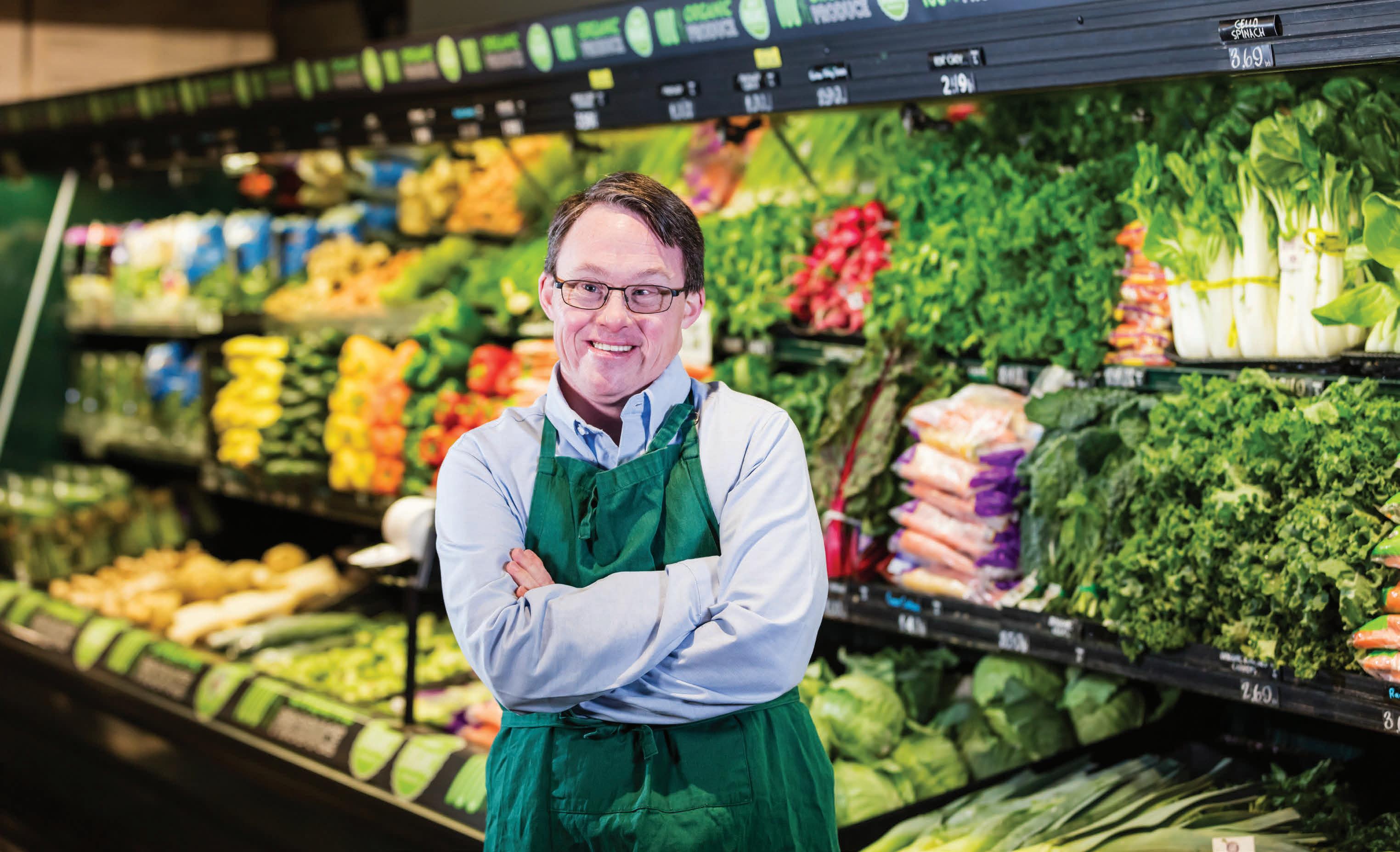

Kerry Clements Marketing & brand manager, Sterling Supergroup
As a true co-operative owned by 36 family-operated wholesalers across the UK, Sterling Supergroup is on a journey to build a sustainable future for our business, our members, and the customers they serve.
We aim to meet today’s business needs without harming future generations. This commitment is reflected in our collaboration with like-minded suppliers, as demonstrated by our Flagship Partners, and our efforts to build sustainable supply chains. We work closely with our own label suppliers who manufacture and source our Sterling Caterers Essentials products, to ensure adherence to the same sustainability criteria. Additionally, we continually seek new ways to build on our practices across our business and share these with our members.
Our members are already adopting a range of sustainable practices within their businesses. These initiatives include reducing food waste, recycling, utilising eco-friendly packaging, and investing in energy-efficient technologies such as LED lighting, energy-saving refrigeration and solar panels. Many also source a wide variety of their products from local suppliers, therefore reducing transport emissions and their overall carbon footprint.
At our recent awards ceremony held at our 58th Annual Conference in Coventry, we were proud to honour Strachans Ltd with the Sustainability Member of the Year Award.
Jamie Ferguson Head of marketing, Parfetts
Parfetts is actively reducing its carbon emissions using new technologies, with a focus on solar energy and energy-efficient lighting. As part of its sustainability initiatives, Parfetts has installed LED lighting and solar panels across all its depots. These installations significantly lower the company’s carbon footprint while generating energy-cost savings, supporting the business in delivering value to customers.
By partnering with Solar Crown Commercial, Parfetts rolled out solar panels to reduce energy costs from 72p to 16.5p per unit during daytime hours. In addition, the switch
They have cut secondary packaging by 80% in their business and have stopped the use of internal single-use plastic entirely. In addition, they have invested more than £100,000 in LED lighting and are actively stripping carbon from their supply chain by only working with suppliers meeting their strict sustainability guidelines. This award recognises their forward-thinking and proactive approach, setting a fantastic example for others to follow.
Additionally, W McClures have recently been awarded the Committed EcoVadis badge. This badge highlights their commitment to sustainability and responsible business practices. The badge is periodically reviewed, showcasing their dedication to continually improving sustainability management and setting high standards for the industry.
As we continue to navigate the challenges and opportunities of the foodservice industry, Sterling Supergroup remains committed to improving its efforts and supporting our members in their journey towards a greener future. Together, we can impact the creation of a more sustainable foodservice wholesale industry, expressing our core principle: Strength Through Co-operation.
to LED lighting, done in collaboration with Procure Direct, offers benefits such as improved energy efficiency, longer lifespan, and low heat emissions.
Parfetts is also helping its retailers by offering access to solar panel expertise. By supporting retailers in their own sustainability efforts, Parfetts encourages the wider adoption of green technologies across its supply chain, further contributing to carbon reduction.
We have also implemented route planning systems designed to create efficiency, enabling us to reduce fuel costs and reduce wastage and have made a move across our company car fleet to electric and hybrid vehicles – all designed to reduce our carbon footprint.
Joe Moulton Marketing manager, Birchall Foodservice
We're delighted to announce that our company carbon emissions dropped by 16% between 2022 and 2023. Our total emissions for 2022 were 2,404 tonnes of CO2. For 2023, that figure was 2,014. This is a fantastic result considering our turnover increased in that time period. This figure follows on from a 46% drop in emissions between 2019 and 2022.
To be transparent, it’s important to note that we measured both Scope 1 and Scope 2 emissions. We only measured three Scope 3 factors (employee commuting, business travel and waste). We are aiming to include the full 15 factors from Scope 3 in future calculations.
Our emissions were measured as part of Country Range’s ongoing project with Climate Partner. This project aims to reduce the group’s emissions year on year. We are now in communication with the East Lancs Chamber of Commerce Low Carbon Team. Using their expertise, we are developing a plan to further reduce our carbon emissions.
We are also committed to promoting sports and enhancing well-being within the workplace through various initiatives. As the headline sponsors of Lowerhouse Cricket Club for the 2023, 2024, and 2025 seasons, we proudly support local sports and community engagement. Additionally, we are the main kit sponsor for Rossendale United Under 15s and a commercial partner for Hunslet RLFC, a professional rugby league club in Beeston, Leeds. We also support junior rock climber Finlay Baldwin, who is aiming to compete in the BMC Youth Climbing Series.
Our commitment to mental health and employee well-being is demonstrated by our partnership with Lancashire Mind, our chosen charity partner for 2024 and 2025. Together, we are working to raise vital funds to support people in Lancashire experiencing poor mental health and its associated challenges. To support our employees’ mental health, we provide access to a fully qualified counsellor who regularly visits our site to offer counselling for those facing difficulties in their work or personal lives.
We also prioritise physical well-being by offering free personal training sessions. l
Tim Murray looks at the latest trends and developments in the foodservice wholesale channel, finding
of ‘Korea opportunities’
As Covid-19 lockdowns and self-isolating disappear further into the rear-view mirror and the past few year’s financial worries and wildly unpredictable weather wane, consumers are increasingly returning to the out-of-home (OOH) dining experience.
What’s more, the outlook for the foodservice sector is looking increasingly bright, as not only are punters flocking back to the OOH market, but they’re spending more as well as broadening their tastes even further. And
out that tastes are widening and there are plenty
with more than half of consumers now considering themselves to be “foodies”, foodservice wholesalers have got to be prepared to go global with their offerings to cater for more adventurous palates.
The latest figures from Lumina Intelligence’s Eating And Drinking Out Panel suggest that almost 60% of UK adults are now actively embracing the OOH market, with consumers dining out an average of 1.6 nights a week, up from 2023. Moreover, spending has risen by an impres-
sive 13.3%, well above the rate of inflation, and as well as turning to higher spending channels, customers are also coming back throughout the day.
As Lumina Insight lead Katie Gallagher notes: “The data reflects positive momentum for the OOH market. Consumers are clearly seeking greater variety and are willing to spend more on premium experiences, which presents a valuable opportunity for suppliers and operators to innovate and tap into these emerging trends.”
Lumina’s data also highlights a new trend of increasing variety in

food choices as even last year’s top 10 dishes have been declining as tastes broaden, and this too brings more opportunity in areas such as “premiumisation, brand partnerships, limited-edition products, and the introduction of world cuisine”, with these expected to show growth.
It’s a view that’s backed up by Bidfood, which has outlined what it thinks will be key trends, with the foodservice giant also noting that tastes are widening. Bidfood’s trends report said that as well as sustainability and health, customers are looking for “elevated experiences”.
Bidfood has identified food from as far-flung places as the Southern States of the US, Turkey, Greece, Argentina, Switzerland and Portugal as being growth areas. But consumers are also sticking closer to home by trying lesser-known regional delicacies from the different countries of the British Isles.
Bidfood’s head of corporate marketing and insight, Catherine Hinchcliff, says: “It’s great to see that this year’s trends are shaped by consumers’ eagerness to experiment and try something new, along with their desire for indulgence, premiumisation and comfort. This will allow chefs to showcase their creative skills, while providing operators the opportunity to increase margin.”
Other trends include “buns and bowls” (on-the-go options that don’t sacrifice quality), increased
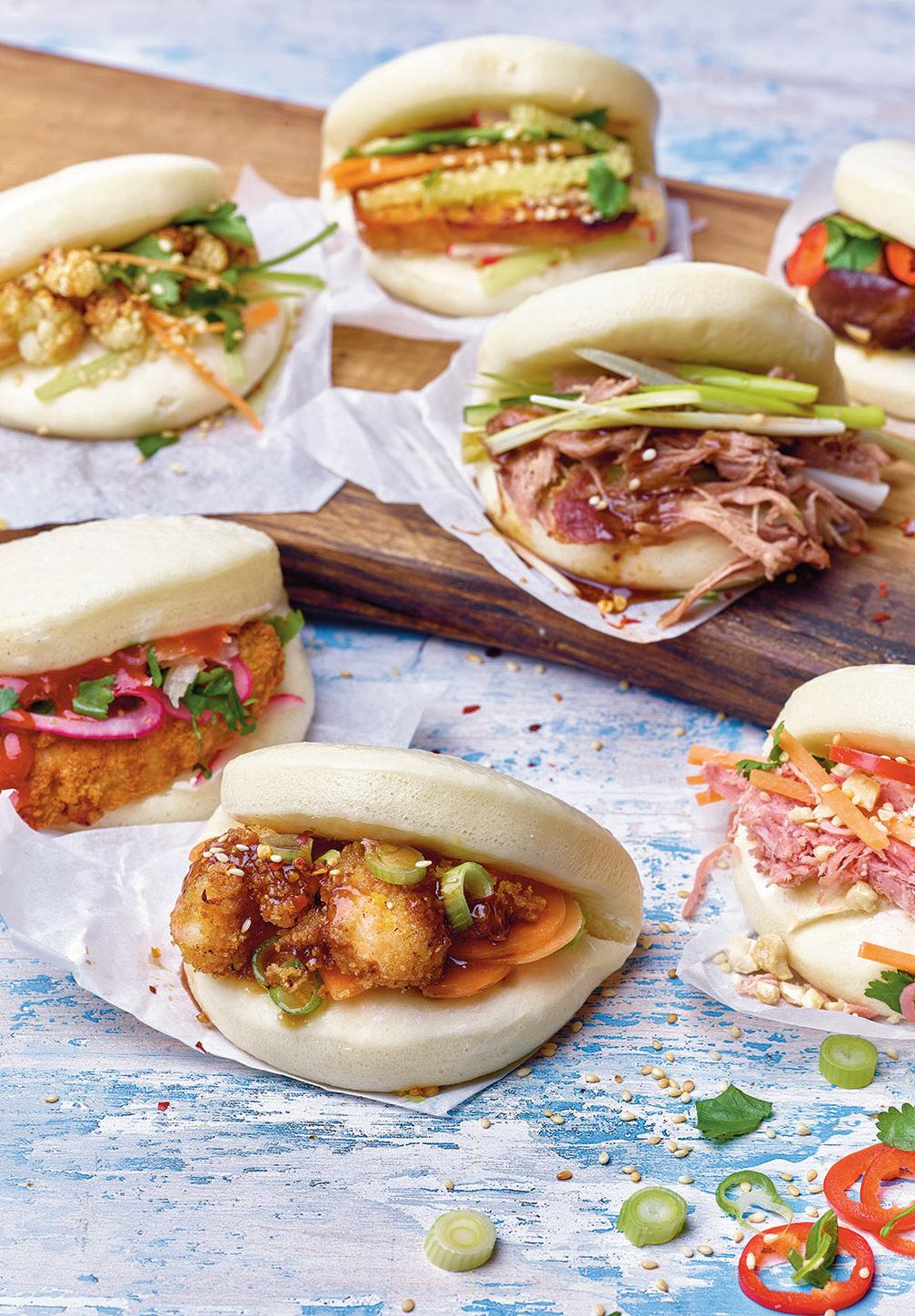
healthy and sustainable choices, and premium hot chocolate and chocolate dishes. Two of the trends spotted by Bidfood have also been spotted over at Central Foods, as it has seen the inexorable rise of Korean pop – K-pop – drive an increased demand for Korean foods, as food from this territory joins British food faves such as Chinese and Indian. Moreover, the street-food-driven popularity of Korean and Asian cuisines is making bao buns more commonplace.
The frozen food distributor’s managing director, Gordon Lauder, says: “One of the biggest trends we are seeing in the foodservice sector is the rise in popularity of Korean foods and Asian flavours and products in general.
“The street-food trend we are currently enjoying has helped to introduce additional Asian inspiration onto menus. Bao buns are big news at the moment across the whole foodservice sector and they are one of our most popular lines.”
Sticking with Korea, Santa Maria recently teamed up with street-food operator Bando Belly to launch a limited-edition

menu of burgers, wings and fries utilising its new Korean range of sauces. Paulig Group head of regional marketing Nick Minchin says: “At Santa Maria, our purpose is to help operators unlock a world of flavour. We’re thrilled to partner with Bando Belly to showcase a mouthwatering, Korean-inspired street-food menu, featuring our new Santa
Maria Korean range.
“As Korean cuisine continues to rise in popularity, this collaboration gives us the opportunity to showcase its bold, vibrant flavours in a truly creative and disruptive way.”
Fries, of course, are a streetfood staple side, and Lamb Weston trade marketing manager Craig Wescott says its Stealth
Fries are the perfect street-food accompaniment. “Your customers will know that street food is hot right now,” he adds. “Street-food vendors tend to offer high-quality, specialised offerings, at prices that are closer to that of fast food than gourmet cooking, and frozen chips and fries are well-placed to provide these menu solutions as a food item with significant mark-up potential when you compare the cost per portion to the sales value.”
Sustainability developments are still cutting across all sectors. In packaging it is crucial, with consumers continuing to demand what Sabert calls “environmentally considerate” materials, but other areas are becoming equally important, too, such as packaging that makes it easier to eat food on the go, or to offer QR codes and other interactive elements, or upping the quality even further.
Sabert’s UK managing director and European commercial director, Alex Noake, says: “More restaurants are elevating their takeaway game with high-quality, aesthetically pleasing packaging that aligns with their brand. At Sabert, we strive to deliver a pre-

mium dining experience outside of the restaurant. Takeaways used to be just about food, but now it is the brands that offer a unique experience that steal a significant share of the market.”
It’s not just packaging, though, it’s also at the source of foodstuffs. At Tilda, its rice is being cultivated through more sustainable alternate wetting and drying (AWD) methods.
Tilda managing director JeanPhilippe Laborde explains: “Rice is a key staple for billions of people, but sadly the traditional methods of cultivation contribute significantly to climate change. Through AWD, we’re proving that it is possible to produce rice in a way that is not only more sustainable, but also beneficial for farmers, who are also seeing both cost savings and improved yields because of using this method.”
And while new trends are emerging, other recent ones are continuing. For Cereal Foods, currently enjoying success with its Harvest Home range within the foodservice sector, the march online, which mushroomed during the pandemic, is still ongoing.
OOH channel manager Mikey Bellingham says: “Since the back of the pandemic, we have noticed a significant rise in OOH customers ordering online. This shift is driven by convenience and provides customers with the ability to manage their shopping basket effectively.
“It eliminates the need for them to close or get cover while they pick up supplies, resulting in the most significant spike we have seen since the pandemic. We have seen more focus from our route-to-market wholesalers investing heavily in online and e-commerce, and I do not see this changing any time soon.”
Nutella continues to be a source of obsession for many, raved about in all its forms on social
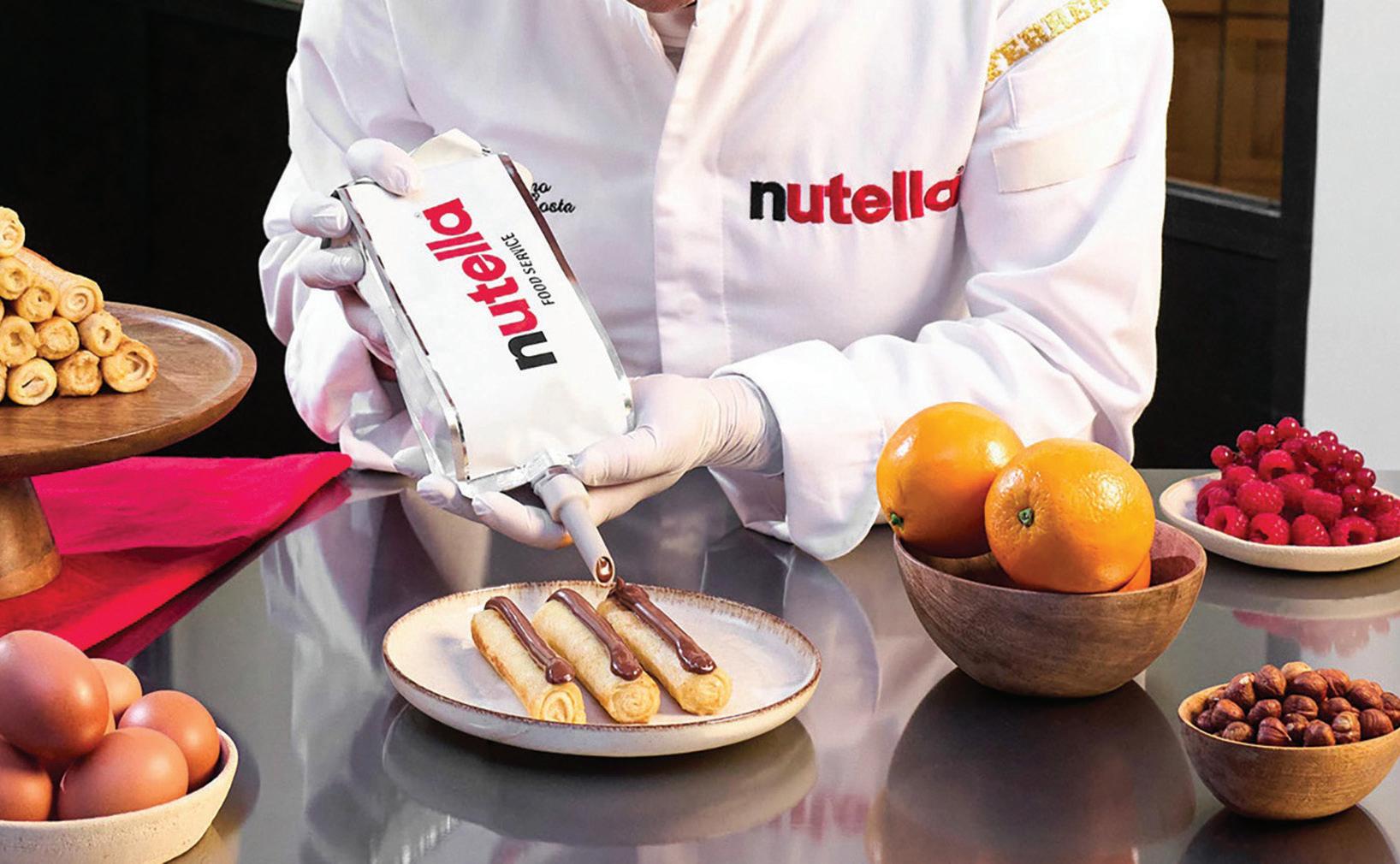

media, with a new cartridge offering from Ferrero Foodservice enabling providers to add the nutty, cocoa spread flavours to anything.
Foodservice shopper activation manager, Ferrero UK & Ireland, Zareen Deboo says: “The Nutella cartridge is a real game-changer for foodservice. Not only is it an innovative standalone product, but it’s the dedicated SKU that works with our new Nutella Dispensers.”
Health and dietary concerns, from vegan and veggie options to free-from products, are also still prevalent. Over at Phat Pasty, the company’s Phat Controller Paul
Clark outlined how his company are offering gluten-free, saying: “This year, we’re excited to add a gluten-free pie to the Phat festive line-up, made in a gluten-free bakery, so we can offer pubs and restaurants a main or starter option, while our other Christmas products allow catering operators across leisure, out-of-home, education, healthcare and B&I, to up-level their food-to-go or lunch menus this season.”
Of course, with Christmas coming up, companies are offering seasonal-themed options to their ranges for foodservice wholesalers. Delice De France has festive sweet products,
including a Double Chocolate Santa Muffin, as well as a Pigs In Blanket Slice, while also catering to wider tastes with Turkish pide and Mediterranean ciabattas.
“Our carefully curated range of seasonal products are the result of months of innovation and years of paying close attention to the trends and the needs of consumers,” says Delice de France chief executive Thierry Cacaly.
“With a focus on vibrancy, interesting tastes and innovative twists on classic, bestselling tastes, we’re confident this range will spread Christmas magic to our customers this winter.” l

amb Weston is an innovative, global supplier of frozen potato products to foodservice, quick service operators and retail. For more than 70 years, it has led the frozen potato industry by the introduction of inventive products, simplified the back-of-house process for catering operators, developed more sustainable ways to grow and process potatoes, and continued to develop delicious products for consumers. From growing potatoes, to proactive customer partnerships, Lamb Weston strives for more and never settles for less.
Sustained marketing activity for the company’s wholesale customers will promote growth in the market, and by working in partnership with wholesalers, Lamb Weston will help them to deliver the perfect range for their customers, meeting current menu trends. To add value to the category, Lamb Weston will employ smart promotional activity, driving penetration, and continuing to enforce and elevate our sustainability goals and values to meet growing consumer needs in this area. l
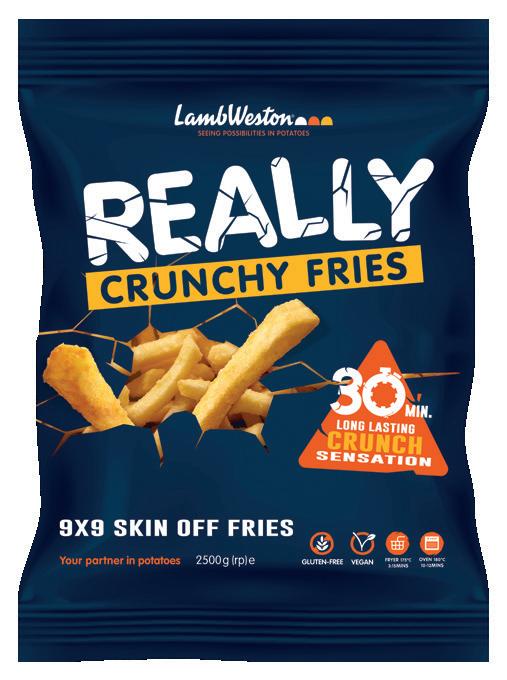
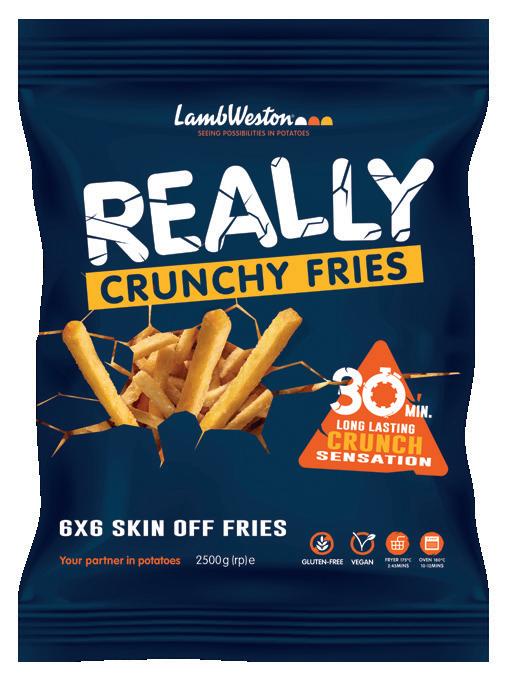
What is the product and why should wholesalers use it?
Lamb Weston supplies the best-quality frozen potato products of every description. A global leader in the field, the company is known for its innovation and expertise, and offers a huge breadth of range, from a delicious range of mash, roast potatoes and a variety of hash browns, to every kind of fries your customers ever dreamed of – and some that they didn’t.
We’re British, we love fries – we even eat them for breakfast. And Lamb Weston has everything from nostalgic Twisters, to Stealth Fries and its latest innovation, Really Crunchy Fries.
In partnership with

How should wholesalers get in touch?
Lamb Weston works closely with its customers to deliver effective sales support and advice on serving suggestions and optimising kitchen operations. These relationships are crucial in delivering success for both catering operators and wholesalers.
We encourage our wholesale customers to leverage insight and support from your supplier; for innovative ideas, recipes and potato inspiration, you can head over to lambweston.eu/uk, call 0800 963962 or email us at salesUK@lambweston.eu.
Lamb Weston is a highly valued partner in the industry and can be found widely available in wholesalers across the country. From our famous Stealth Fries to much-loved Twisters, from coast to coast – you should be able to buy our delicious range. However, in the rare event you can’t find the Lamb Weston range, please get in touch and we would be delighted to discuss how we can support your business.
It’s important to get the message across to catering operators that having a secondary potato on menu can deliver incrementality without taking away from the main fry. For instance, by listing Twisters, you can offer a sense of nostalgia. Childhood classics with ‘grown-up’ elements directly appeal to nostalgiaseeking diners, with innovators taking old-school originals far beyond in terms of overall techniques and ingredients, yet still delivering the same comforting tastes and textures*.
*Egg soldiers – Talking Trends: The New Wave of NostalgiaDriven Comfort Food Innovators (eggsoldiers.co.uk)
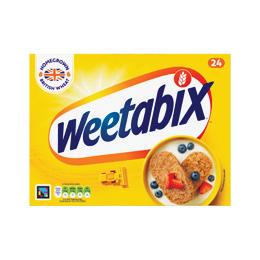


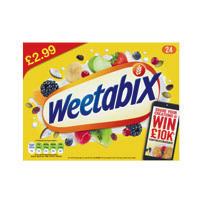


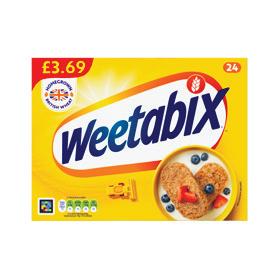
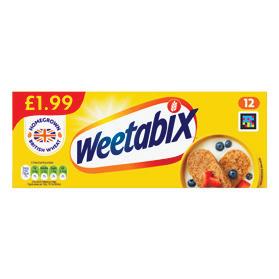
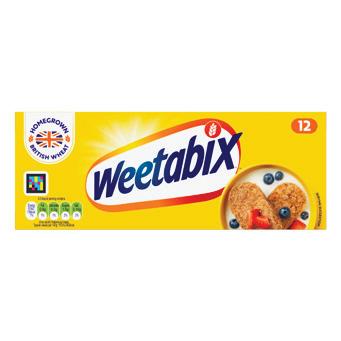
Focus o n a co re
range
Focus o n a co re range o f b est-s to ma ke it a
ch oic e for y ou r cus tom ers

Put t he b igg est se lle rs o n t he mi dd le sh el ve s to
Put t he b igg est se lle rs o n t he mi dd le sh el ve s to
fi nd t he m e asi ly
fi nd t he m e asi ly
Incl ud e a range o f
Incl ud e a range o f
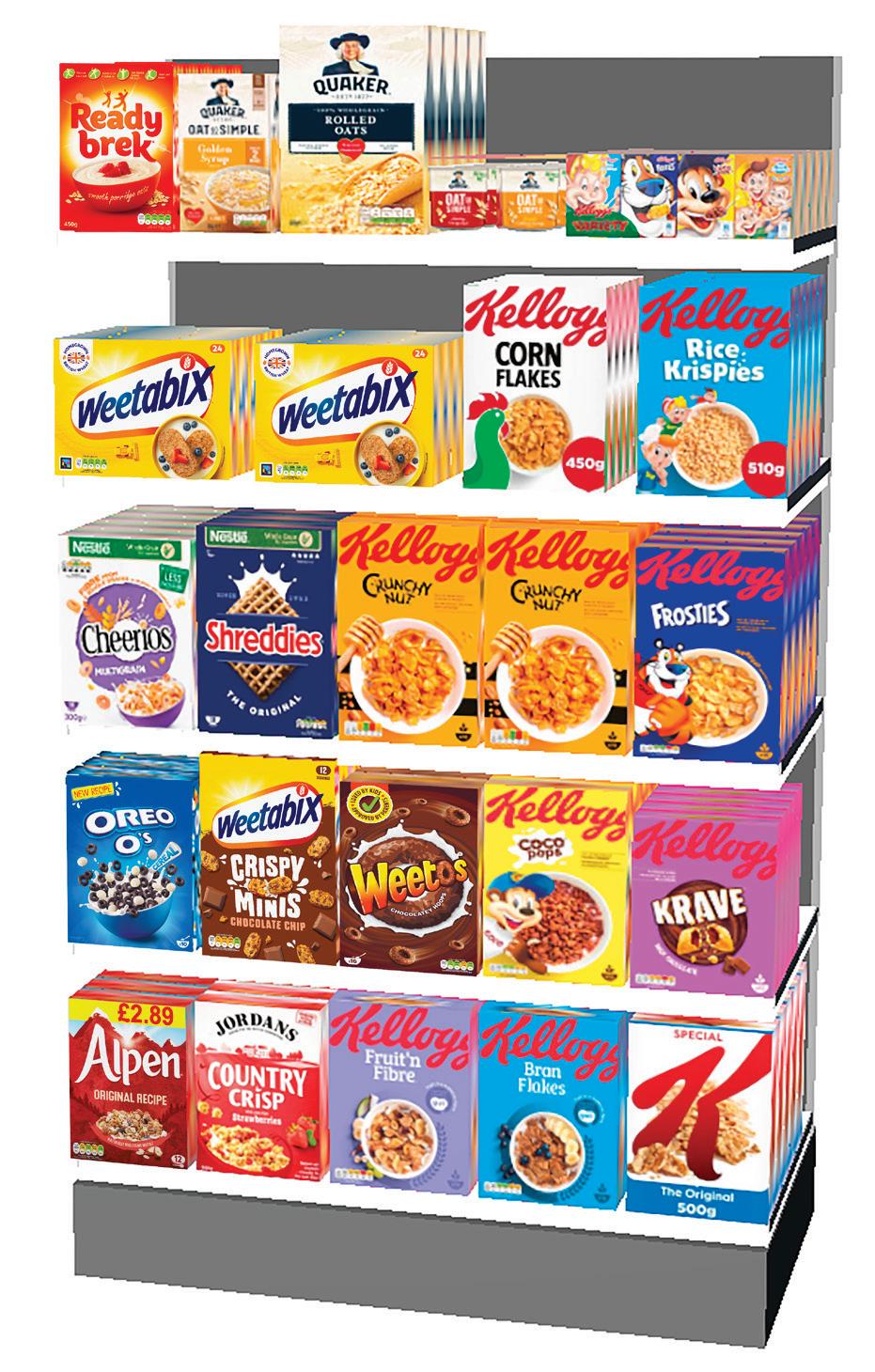

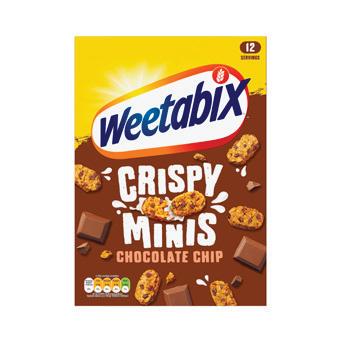





The cereal company explains how its portfolio of household-name breakfast products is a must-stock for wholesalers across their depot shelves
As the nation’s favourite cereal1, Weetabix is the clear choice for any retailer looking to maximise their break fast offering. The iconic lozenge branding is a familiar mark of premium and quality, guaranteeing locally sourced British wheat from within 50 miles of its mills, 100% recyclable packaging, as well as a range of added value competitions across the year that drive fresh shop per interest in the aisle.
With exciting news to come in 2025, depots won’t want to miss out on stocking the full Weetabix Food Company portfolio – from Weetabix Minis, to Alpen and family favourite Ready Brek.




Own-label cereals have drawn in shoppers as some consumers made the trade-off between brands and private label during tougher periods. However, the cereal market is on track for full recovery as consumers recognise the premium and quality of buying branded – with Weetabix Original and Weetabix Minis both seeing total market value and volume growth in June2.
Retailers can capitalise on this opportunity by making a clearly defined breakfast display with a full range of trusted household cereal brands, such as Weetabix Original, Weetabix Minis, Weetos and Alpen, putting a selection of shopper favourites in clear display.
Scott Bayliss Head of sales, Weetabix

“Weetabix is a beacon brand for the breakfast category and is enjoyed by nine million households across the UK. We understand the needs of our breakfast customers and tick the boxes for nutrition as well as flavour, meeting HFSS compliance. Offering a wide variety of popular formats and styles across our portfolio gives retailers a strong core offering for everyone – backed by a quality household brand and exciting investments to come in the new year that are sure to drive engagement with the category even further.”

Confectionery continues to be an evolving category, with nostalgia and traditional flavours driving growth within it.
Lydia Stubbins, group marketing director at Divine Chocolate, says: “At Divine, we’ve identified a gap in the block chocolate market for a range of bars that bring these flavours to life in an indulgent and premium way.
“Divine has also tapped into this trend with its Christmas range by delivering classic items consumers associate with Christmas,
including stocking fillers such as Chocolate Coins and Mint Thins.”
Seasonality also plays a huge role in meeting nostalgia trends, and wholesalers would benefit by including selection boxes, advent calendars and novelty items, such as festive lollipops, chocolate coins and candy canes.
All major suppliers, including Nestlé Confectionery, have launched their Christmas ranges already. Alongside the return of Nestlé Smarties Elf Treats Giant Tube, a pack of red and green smarties, and Milkybar Fairy Lights, a chocolate tablet mixing

“One of Divine’s most important product ranges is dark chocolates, which are not only bestsellers, but are also reflective of changing category trends.
“Divine has seen the strongest unit growth year on year from its dark chocolate range – outpacing white and milk chocolate – and according to Morder Intelligence, trends for higher-cocoa indulgence are gathering speed, with dark chocolate expected to be the fastest-growing sub-segment of the premium chocolate market from 2024 to 2030.
“We’re hearing a lot of consumers now talking about how they are looking for ‘healthier’ chocolate and treats. As dark chocolate has a lower sugar content than milk or white, it fits
with this demand.
“When it comes to Christmas, at Divine, our festive must-haves, such as chocolate coins and advent calendars, are both available in milk and 70% dark chocolate.
“Divine’s Dark Chocolate Advent Calendar and coins are also both vegan, 100% Fairtrade and palm-oil-free –our Chocolate Choices are the perfect addition to stockings.
“On-trend products are a great way to increase profit margins – they often come at a slightly more premium price, but consumers are usually willing to pay more for these.
“Stocking on-trend products can help your retailers’ stores become destinations customers are willing to travel to.”


Milkybar white chocolate with crispy mini milk chocolate, new launches include Aero Orange Bubbles Sharing Pouch and Matchmakers Hazelnut.
From Mars Wrigley, wholesalers can stock M&M’s Crispy Santa Shapes, consisting of a milk-chocolate Santa filled with creamy vanilla, crispy surprises and M&M’s Minis. “It taps into a demand for the self-eat category, which is growing by 2% year on year, and small shapes, which
account for 36% of Christmas sales,” explains Matt Boulter, UK sales director at Mars Wrigley.
“It is an ideal permissible treat, meeting multiple consumer needs while bringing the brand’s signature fun to the festive season.” Also meeting the nostalgia trend is Mars Wrigley’s M&M’s Minis, which began in 1997, but was relaunched earlier this year.
“M&M’s Minis are set to unlock shopper penetration by recruiting younger consumers to
the category, where Mars Wrigley already leads with a 42% market share,” Boulter continues.
Premium chocolate has long been important within confectionery, as consumers look to treat themselves more, and it’s in growth once again, especially as the Christmas period ramps up.
“It would be key to make sure that over the Christmas period, this is something you are stocked
up on, so your customers can take advantage of this,” explains Stubbins.
While the link to seasonality is clear, premium chocolate sales are also outperforming total chocolate-bar unit sales in impulse specifically. Total chocolate-bar unit sales were down by 8% over the past year, but premium chocolatebar unit sales were up 17.4%.
“If you’re going to invest in premium chocolate, Divine is a strong brand to do this with,

as it’s the leading one in terms of unit growth over the past 12 weeks – up by 47% year on year,” says Stubbins.
With the Consumer Prices Index rising by 1.7% in the 12 months to September 2024, shoppers are living on a budget, and it’s a trend wholesalers need to cater to in depots.
This is where own-label options play a strong role, as many will opt towards this instead of named brands.
Price-marked packs (PMPs) are particularly important within confectionery as they offer clear value and price transparency.
“Customers often perceive PMPs as a better deal, which can increase frequency of purchase, and wholesalers can use PMPs to strengthen shopper confidence

and ensure strong performance in high-volume, fast-moving categories, like confectionery,” says Clare Newton, trade marketing manager at Swizzels.
It’s important to not underestimate the value of treats, however, so wholesalers need to strike that balance between value options and those with a higher RRPs.
“Even in times of economic uncertainty, treating and snacking remain high, and 96% of these products are chosen for pleasure,” adds Boulter.
“With the growing emphasis on health and wellness, consumers are making more conscious choices, opting for confectionery products with reduced sugar and natural ingredients,” Boulter says. “This has led to an expansion of health-




Reese’s DJ Santa Advent Calendar – Reese’s has launched a DJ Santa Advent Calendar, which offers the chance to win prices, including a £5,000 grand prize. The brand’s peanut butter cups are either Original or White.

Mars Wrigley’s festive 2024 range – Mars Wrigley has added two new lines to its range: M&M’s Crispy Milk Chocolate Santa Treat and Twix & Friends Medium Selection Box. The Box contains three Twix flavours.

Swizzels Naughty & Nice Squashies – Swizzels has added a limited-edition Naughty & Nice Squashies line to its Christmas range. It contains elf-shaped Squashies in Strawberry Ice Cream and Apple Pie flavours.

Reese’s Fast Break – This new chocolate bar from the US brand is available now to the UK market, Reese’s Fast Break is a nougat bar containing peanut butter, and is available to all major wholesalers.
ier alternatives. Prominently display these options to cater to health-conscious consumers.”
Stubbins also echoes these thoughts, claiming dark chocolate is a strong product to stock. This is because they have a lower sugar content than milk or white chocolate.
As a result of growing health trends, plant-based, vegan and vegetarian diets are more prominent. In 2024, there are an estimated 2.5 million vegans, 3.1 million vegetarians and three million pescatarians in the UK.
“By stocking plant-based confectionery, wholesalers can tap into the growing demand for vegan sweets while meeting the needs of a broader audience,” continues Newton.
Vegan and vegetarian confectionery is a strong entry point into the category, and Newton
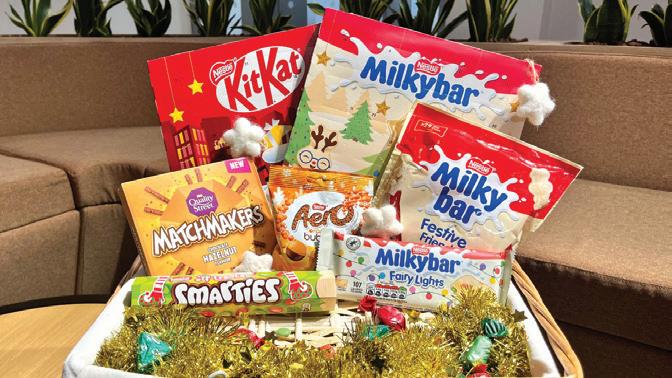
Nestlé Confectionery’s 2024 Christmas range – Aero Orange Bubbles Sharing Pouch, Smarties Elf Treats Giant Tube, Milkybar Fairy Lights, Matchmakers Hazelnut and a KitKat Selection Box all join this year’s range.

Bobby’s trio sharing bags – Blue Razz Dreams, Fruit Fools and Vimto Fried Eggs are available in £1.25 PMP bags. Blue Razz Dreams is a blue raspberry variety of the brand’s popular Strawberry Dreams line.

















































































































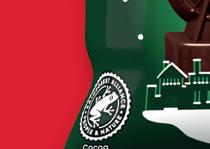













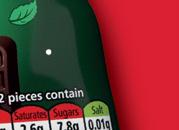


























says wholesalers should focus on well-established brands that are already vegan-friendly. This includes the Swizzels range, which appeals to vegans and flexitarians.
“Offering a selection of favourites, alongside vegan alternatives, ensures wholesalers cater to a broad customer base, from those seeking nostalgic treats to those exploring more sustainable options. Featuring brands with a long-standing reputation in the confectionery market can help
drive sales and build customer trust,” Newton says.
“The vast majority of Swizzels sweets are vegan, catering to a diverse demographic of vegetarians, vegans and flexitarians who are seeking indulgence.”
Overall, Stubbins advises wholesalers “tap into consumerled trends or ways of thinking”. by stocking day-to-day classics that include different flavours and tastes, like the current rise in dark chocolate or nostalgic products.
1. Nostalgia and seasonality are important – Nostalgia and traditional flavours, such as dark chocolate, are driving growth in confectionery. This is specifically true within block chocolate, which can bring different flavours to life in an indulgent and premium way. An example of this is the Divine chocolate and Lindt block ranges, where some of its flavours include A Touch of Sea Salt and Extra Creamy Milk. Seasonality plays a strong role in meeting nostalgia trends as shoppers get into the festive mood and are encouraged to spend more. Key products include selection boxes, advent calendars and novelty confectionery, such as chocolate coins.
2. Premium chocolate is growing – Premium chocolate-bar unit sales are up 17.4% in the past year, whereas total chocolate-bar unit sales were down 8%. The popularity of premium chocolate can be attributed to a rise in the popularity of treats, on which shoppers are willing to spend more. It also grows during key seasonal periods, such as Christmas. It’s recommended to focus on well-known premium options, such as Divine or Green & Black’s, within depots. Divine premium chocolate sales are up in terms of unit sales growth, up by 47% year on year in the past 12 weeks.
3. Health and alternative diets – There are a combined estimated total of 8.6 million vegans, vegetarians and pescatarians in the UK alone, and confectionery is a strong entry point to cater to this demand. Wholesalers should focus on well-established brands that are already vegan-friendly, such as the Swizzels range, where the vast majority is already vegan. Catering to other health trends, dark chocolate is a must-have range in depots. This is thanks to their lower sugar content than milk or white chocolate, arguably making them healthier, or perceived that way. There are also smaller formats that would meet health and indulgent trends. l

Tamara Birch

Within the hot beverages sector, decaf coffee should be a core area of focus for wholesalers, according to Edward Watts, UK&I sales director at Jacobs Douwe Egberts (JDE), due to growing health-conscious consumers.
“While some segments continue to decline, total decaf value sales have remained in growth,” Watts explains. “They now make up a quarter of all instant coffee sales, showing the opportunity for wholesalers to offer high-quality decaf options.”
Kenco is the number-one brand for instant decaf, as recorded in the Total Coverage Grocery
Value Sales Data from Nielsen.
“Offering a decaf version from a trusted and familiar brand that consumers know delivers on taste and quality, makes it a key product from wholesalers as we look ahead,” Watts adds.
Decaf options play into growing health trends, and expands into the ready-to-drink (RTD) category.
“As health continues to become a greater focus for consumers, growth is anticipated in share of no-added-sugar and protein options to reflect the wider soft drinks category,” says Adam Hacking, head of beverages at Arla Foods.
“In line with this, this year saw the launch of Starbucks Protein Drink with Coffee and
Edward Watts UK&I sales director, Jacobs Douwe Egberts
“Where possible, stock a diverse range of products from different coffee sub-categories, to appeal to a wider range of people and various coffee consumption occasions. Ensure you have good availability, so there’s no need to shop around.
“Also, when and if possible, stock innovations to keep the category new and in line with trends to encourage purchase.
“With this continued pressure on household spending, consumers are looking at how they can make simple switches to save money – including swapping their coffee shop visit for a version at home. In fact, 53% of consumers say they are cutting down on their coffee

shop visits to save money and 79% of in-home coffee cups are made using instant products, so stocking a good range of products from brands consumers know and trust is a must.
“Jacobs Douwe Egberts brands continue to be a household staple as consumers are turning to trusted and familiar brands they know deliver on taste and quality.
“This is particularly important within the instant coffee category as 9.4 million households buy Jacobs Douwe Egberts instant coffee products specifically, showcasing a valuable opportunity in the market, which wholesalers should capitalise on.”






































Don’t miss out on sales of the






Galaxy Hot Chocolate – Galaxy Instant Hot Chocolate celebrates 25 years of the product contributing massively to the sector. Its flavour developments include Fudge Brownie and format innovations, such as sticks.



Starbucks White Chocolate Mocha Multiserve – The limited-edition White Chocolate Mocha is available in a 750ml multiserve format for Christmas, and blends bold espresso, creamy milk and white chocolate.
Starbucks Frappuccino Caramel No Added Sugar.”
The high-protein range from Starbucks, according to the supplier, has increased in value from £46m in 2021 to £147m in 2024.
More shoppers than ever are shopping on a budget, but there are products they won’t compromise on, and that’s the taste of hot beverages and cold brews.
As a result, consumers have been investing in coffee machines, which is where pods play a vital role for wholesalers. “Consumers are primarily influenced by the equipment they own – whether it’s a pod machine, an espresso machine or a simple cafetiere,” says Phil Smith, head of category & insight at UCC



Kenco Gold launches 95g jar – JDE has expanded its range with Kenco Gold with a 95g jar, available now. Since its launch in 2023, Kenco Gold Indulgence has exceeded £4.2m in value sales.



Starbucks Protein Drink with Coffee – The new protein coffee drink contains 20g of protein in each 330ml bottle, as well as low-fat milk and no added sugar. It’s available in Caffe Latte, Chocolate Mocha and Caramel Hazelnut.
Coffee UK & Ireland.
Beyond the equipment, the strength and intensity of the coffee is the second consideration.
It’s this at-home coffee that shoppers consider more affordable, and enables them to make “real coffee”, Smith says. “By recreating barista-level experiences at home, consumers enjoy luxury while still benefiting from cost savings compared to purchasing out of home.”
Wholesalers also need to cater for those who don’t have a pod or espresso machine at home. These products include Kenco Original Cappuccino and Latte Sachets, which help meet onthe-go missions, too, as well as ongoing value missions.
Sharing or multi-serve options, according to Hacking, is the fastest-growing segment in
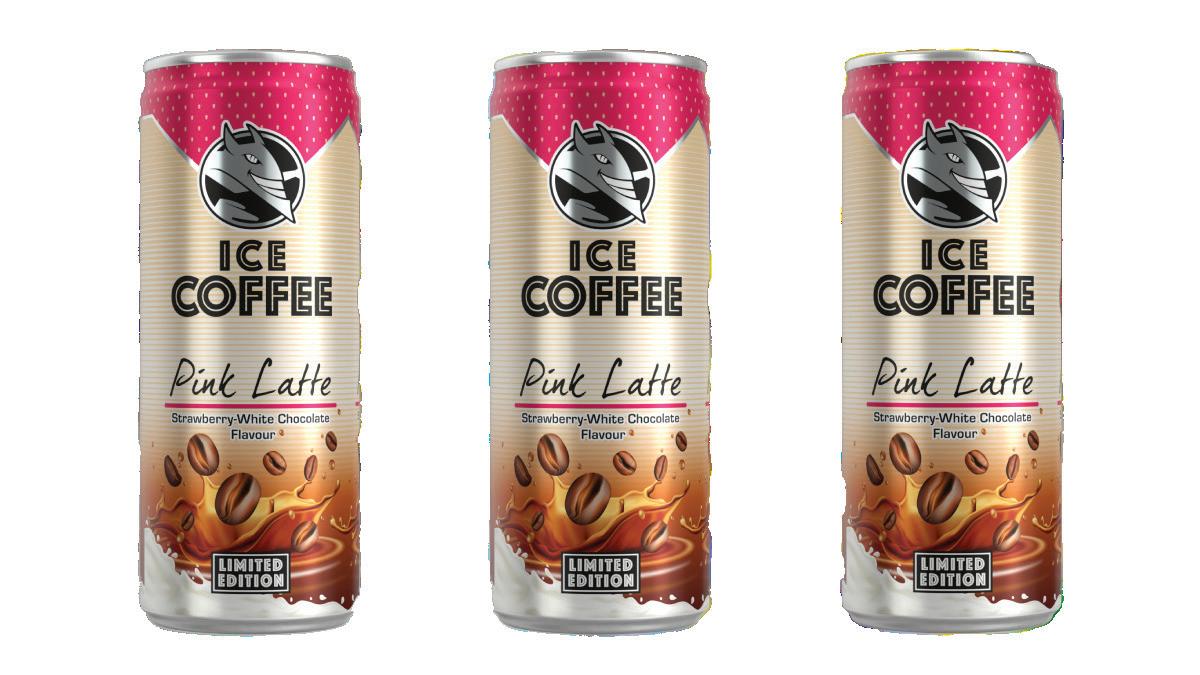
Hell Pink Latte Iced Coffee – Hell Beverages has expanded its Ice Coffee range of RTD chilled drinks with Pink Latte, a strawberry and white chocolate flavour, following its Mocha launch in April.


Twinings Fruit Cooler range – Twinings Fruit Cooler is available in Peach and Tropical varieties to be enjoyed chilled. Data from Twinings suggests 32% of consumers enjoyed iced or cold tea in the 12 months up to November 2023.
The ultimate stocking guide for independent news and convenience retailers!
What to Stock takes an in-depth look at the sales and profit opportunities for stores like yours, alongside category data and trends across convenience retail’s 35 core categories
Distribution and profit opportunities
The rapidly climbing products in ‘Ones to Watch’ Weekly sales and profit data
The top profit drivers in each category
Get your digital copy today at bit.ly/WhatToStock24 or by scanning the QR code


RTD coffee as shoppers look to new consumption occasions and use the product more as a take-home drink. “The Starbucks Multiserve range (750ml sharing size formats) now has four core lines, including Skinny Latte, Caramel Macchiato, Caffe Latte and Cappuccino.
“Building on this further and adding excitement to the at-home occasion, the limited-edition product for the festive season is Starbucks White Chocolate Mocha, which is available in a 750ml carton.
With sharing, multiserve and the at-home occasion, personalisation, taste and flavour are important for wholesalers to focus on.
“Every coffee drinker has their preference. Coffee used to be regarded largely as a simple morning beverage, but now consumers
increasingly see it as a lifestyle product that can be tailored to their preferences and enjoyed in a variety of ways throughout the day,” continues Watts.
The on-the-go phenomenon
Although there’s been a shift toward at-home hot beverages and cold brew occasions, wholesalers need to cater for the on-the-go missions through RTD options, a category now worth £280m.
“Consumers are buying into the category primarily for taste and this is reflected in our ethos of flavour quality and innovation,” Hacking says.
“Worth £145m, Starbucks chilled coffee is the leading player within the RTD category and has continued to grow with an 18% value and 25% volume increase in the past 12 months.”

This growth is also attributed to different flavours entering the market, too. The reason behind this is it enables customer customisation to suit their personal taste.
From a seasonal perspective, gingerbread and white chocolate are popular as they are synonymous with Christmas. Caramel Macchiato and Caramel Hazelnut are rising, too.
Chilled on-the-go products that are must-stocks, according to Hacking, are the Starbucks Chilled Classics range in Caffe Latte, Skinny Latte and Caramel Macchiato, and the Starbucks Frappuccino range, available in Caramel and Coffee flavours.
With the rise of plant-based diets, Starbucks Oat Based
Vanilla Macchiato could help meet both this demand and flavour occasions, too.
Tea and hot chocolate trends
Thirty-two percent of UK consumers enjoyed iced or cold tea and infusions in the 12 months leading up to November 2023, according to data from Twinings.
Iced and cold tea options are healthier alternatives for consumers, as they tend to be lower calorie or offer ‘added benefits’. Lemon tea, for example, helps with hydration and acts as an antioxidant that can help with chest congestion and recovery – key for the winter months.
In August, Twinings launched

a range of Fruit Coolers in Peach and Tropical flavours, available nationwide to wholesalers.
The height of winter, however, is less about cold drinks, but more towards hot chocolate and other hot beverages. For on-the-go missions, instant hot chocolate, such as Galaxy Hot Chocolate, will be a go-to.
“Galaxy Instant hot chocolate
remains our portfolio hero with new customers being drawn into our range with on-trend flavour developments, such as Galaxy Fudge Brownie and format innovations, such as sticks, pods and hot chocolate stations attracting new shoppers to the range,” concludes Michelle Frost, general manager at Mars Chocolate Drinks and Treats.
Starbucks chilled coffee has continued to grow, with a 25% volume increase in the past 12 months
1. Decaf coffee and healthier options – Decaf coffee, low-calorie or added-benefit drinks are in growth. Decaf coffee, for example, makes up a quarter of all instant coffee sales and total decaf value sales have remained in growth. Offering trusted brands in this area will put consumers at ease, and according to the latest Nielsen data, Kenco is the number-one brand for instant decaf. Highprotein options also meet growing health trends, as they not only offer higher protein levels, but are often low in calories, fat and sugar. Starbucks’ high-protein range offers 20g of protein per 330ml bottle.
2. Offer affordable, but premium options – Customers might be recreating the coffee-shop experience at home, thanks to growing inflation rates and the cost-of-living crisis, but they still want premium options. This ranges from having a pod or espresso machine, meaning products like Tassimo are must-stocks in depots, or sachets for on-the-go missions, like Kenco Original Cappuccino and Latte sachets. Known brands play a strong role in this area, as shoppers choose from trusted brands in hot beverages, so wholesalers would benefit from including lines such as Starbucks, Kenco, UCC and Nescafé.
3. Don’t forget alternative hot and cold beverages – Hot beverages and cold brews is more than just coffee. Depots need to include hot chocolate and tea options, too. Within tea, drinks with ‘added benefits’ are strong, such as lemon, green or mint tea, as well as the traditional tea bags from PG Tips and Yorkshire Tea. Within hot chocolate, the biggest brands are Dairy Milk and Galaxy, both of which have options of instant and regular hot chocolate. For health trends, Dairy Milk Light Hot Chocolate is low in sugar and calories. l
We can help get your products into one of the largest channels in the UK…
Our wholesale solutions reach over 5,000 wholesale decisionmakers, sharing product news, ranging tips and best-practice advice
…from convenience and foodservice wholesale depots… …to independent convenience stores across the country…
Our print and digital products reach over 40,000 independent news and convenience retailers, helping store owners decide what to stock …and into the hands of consumers.




